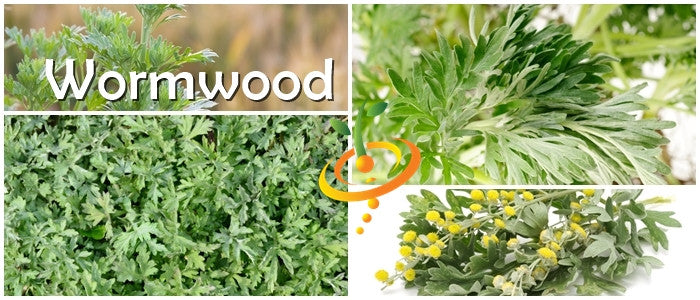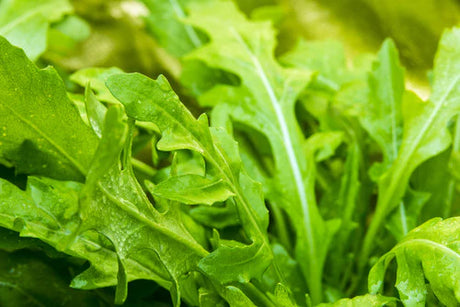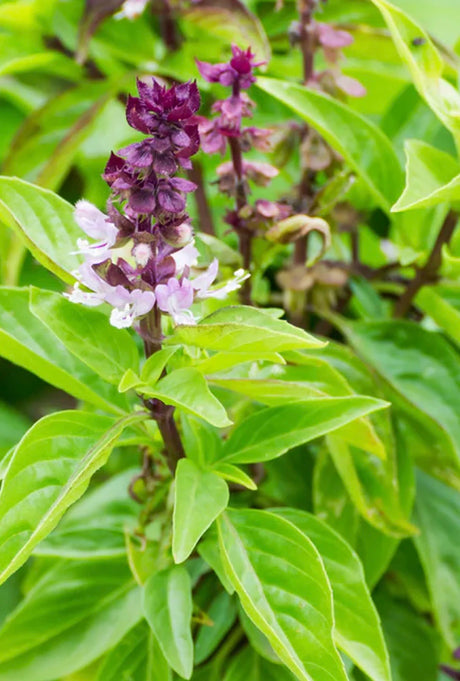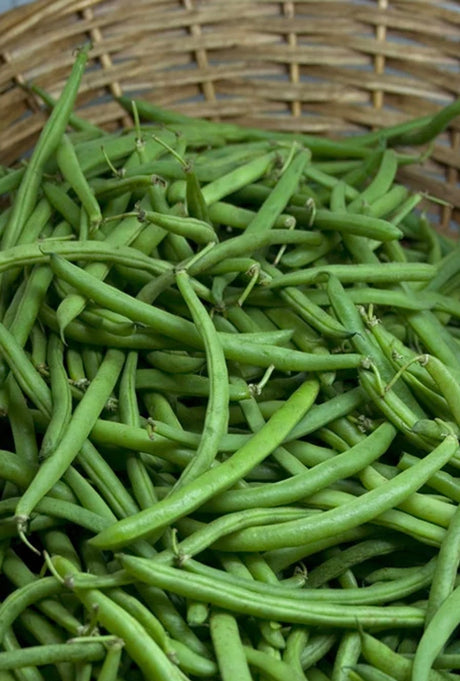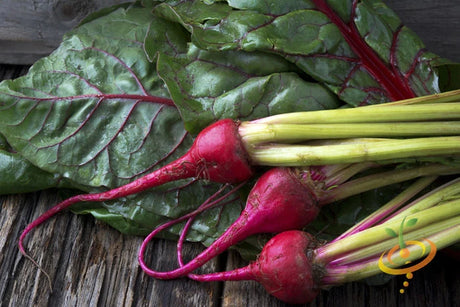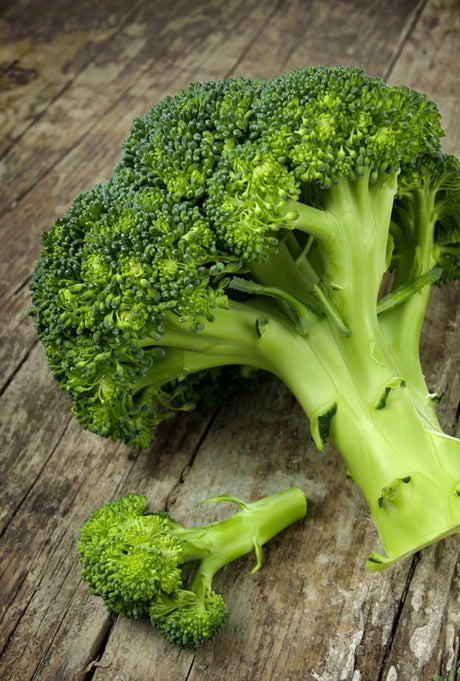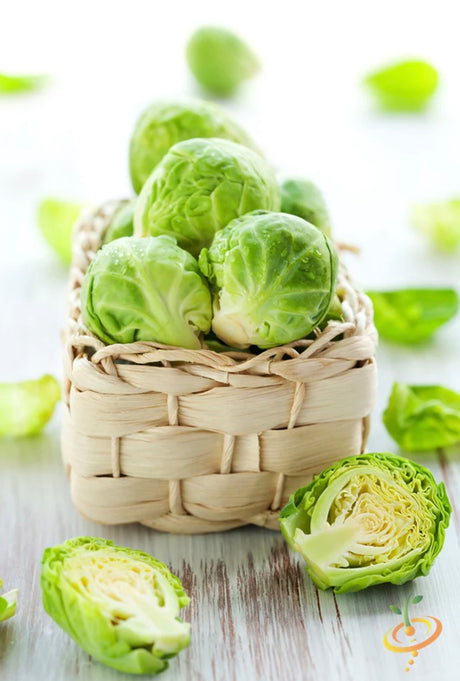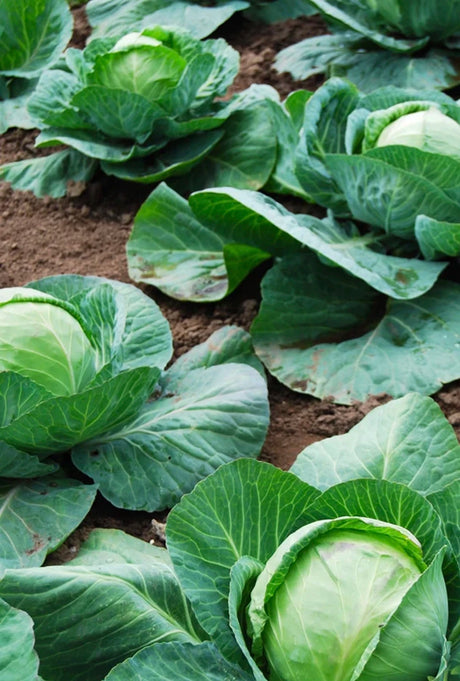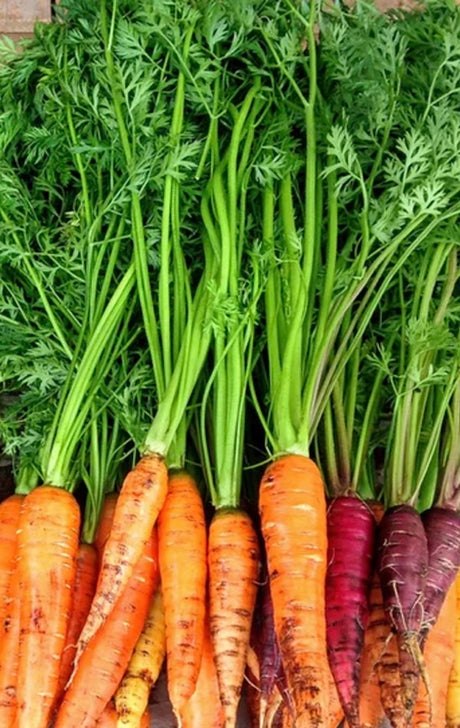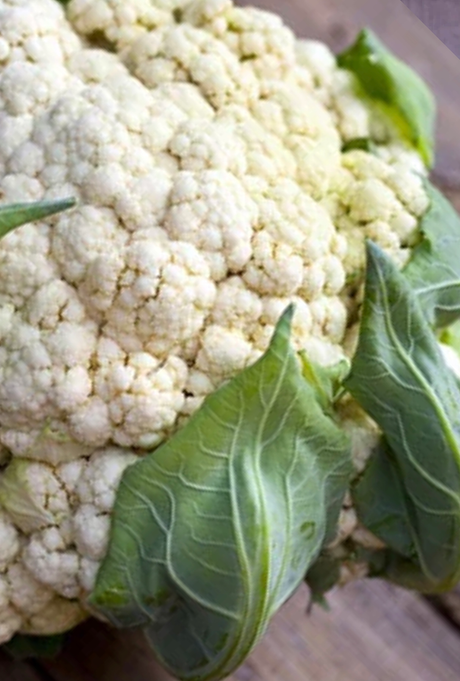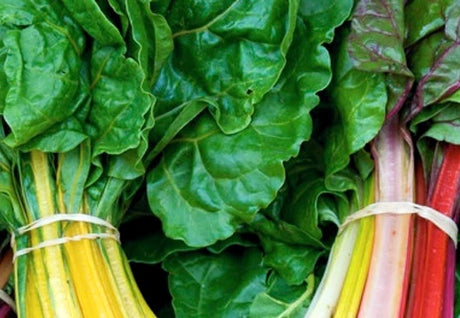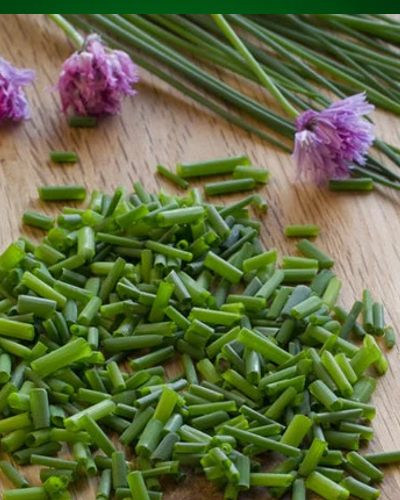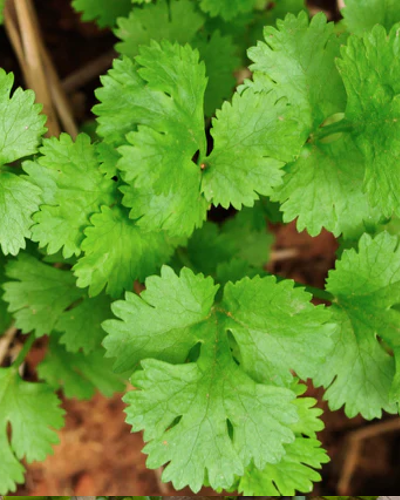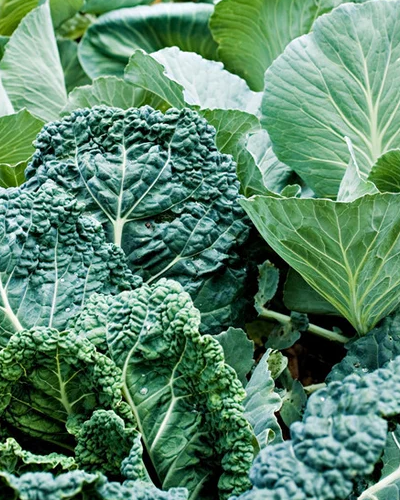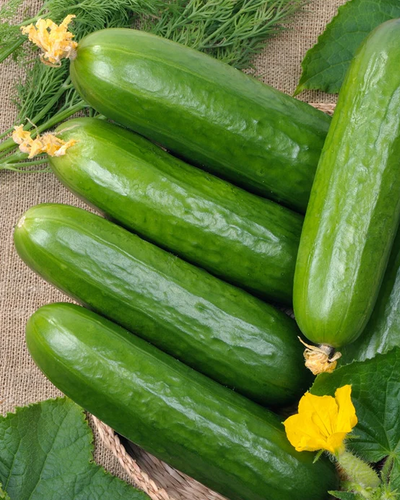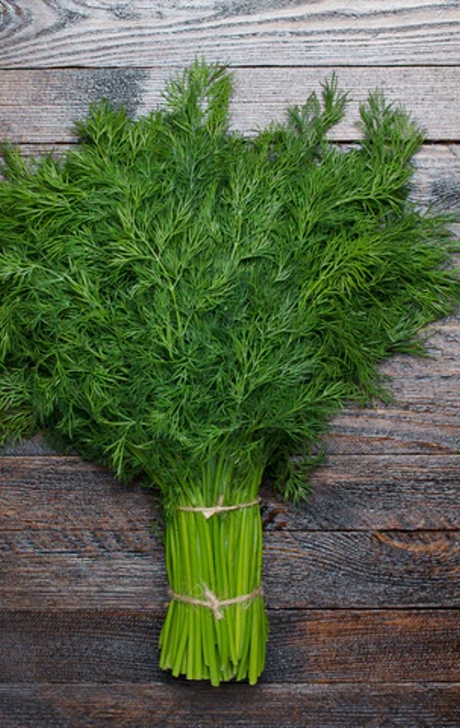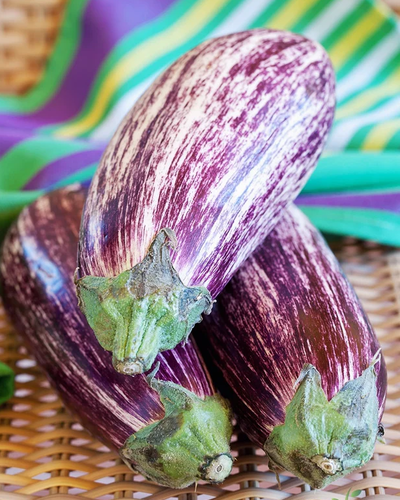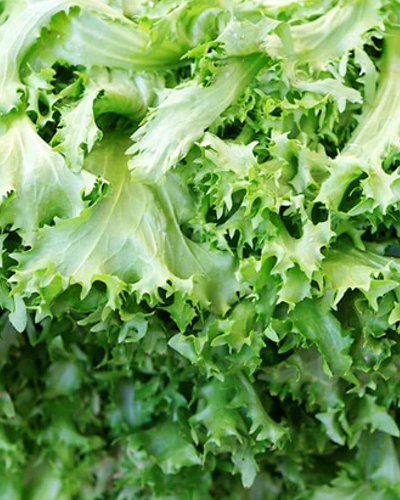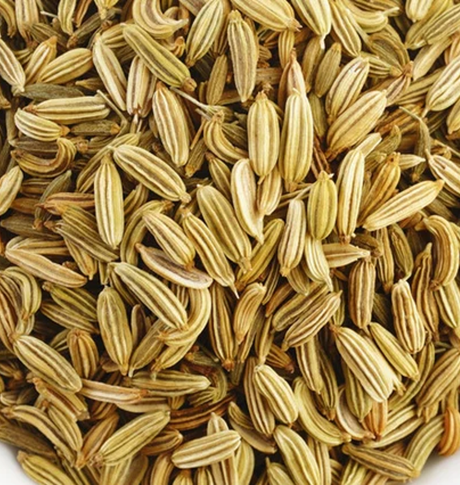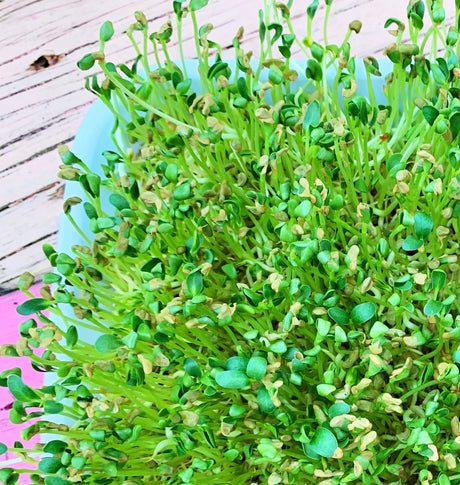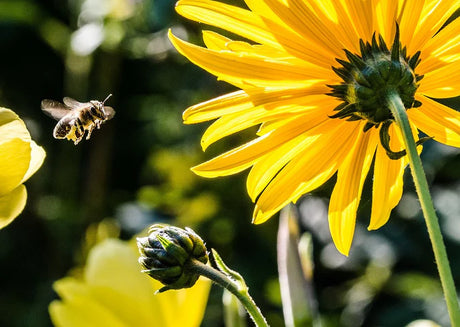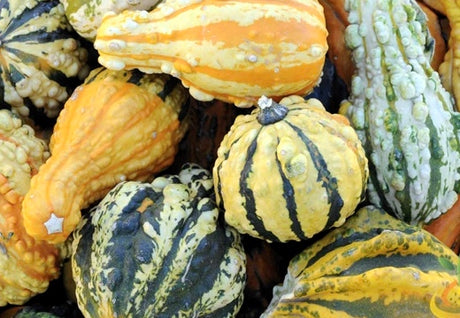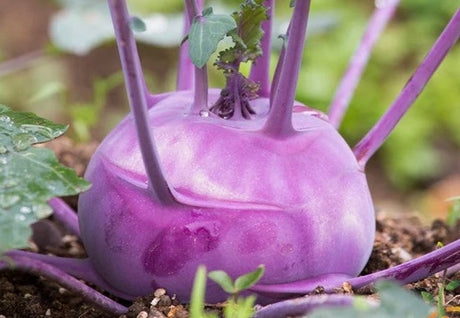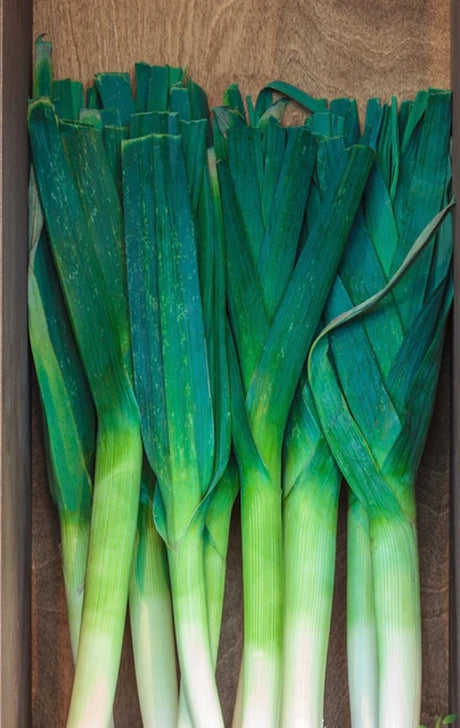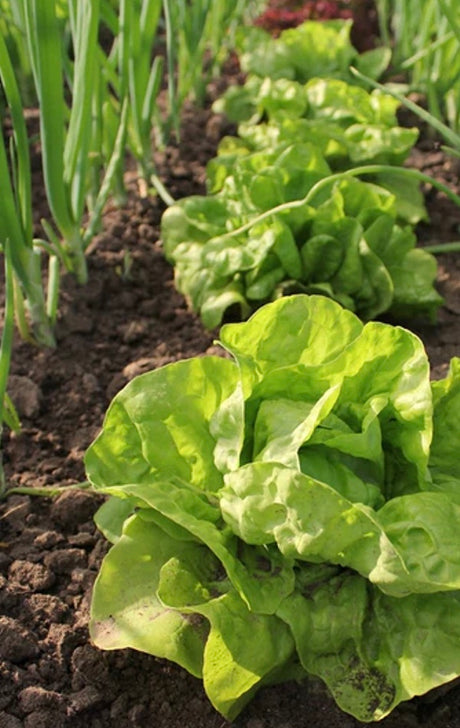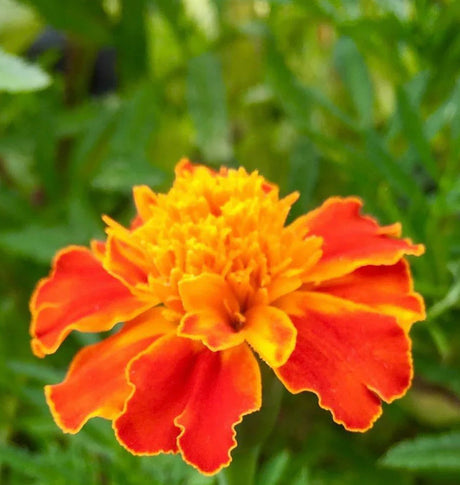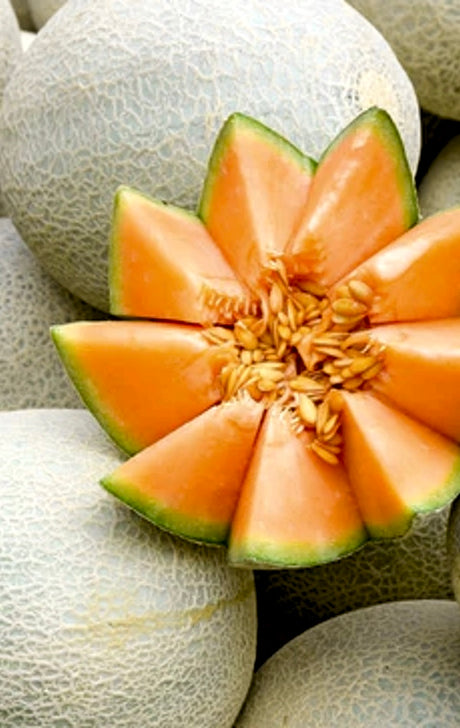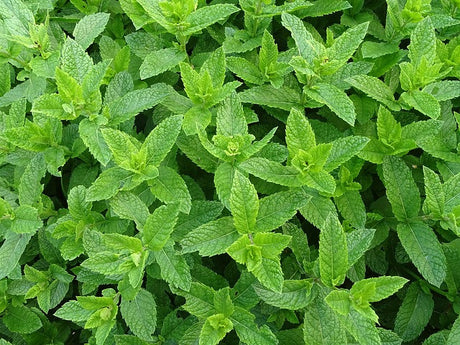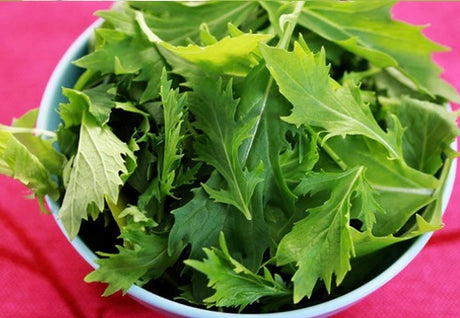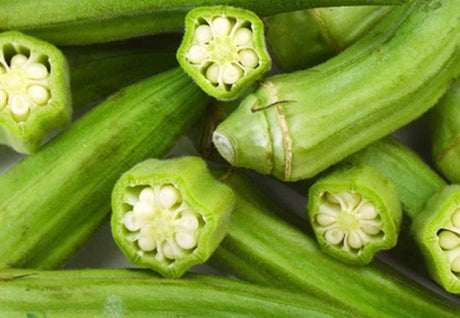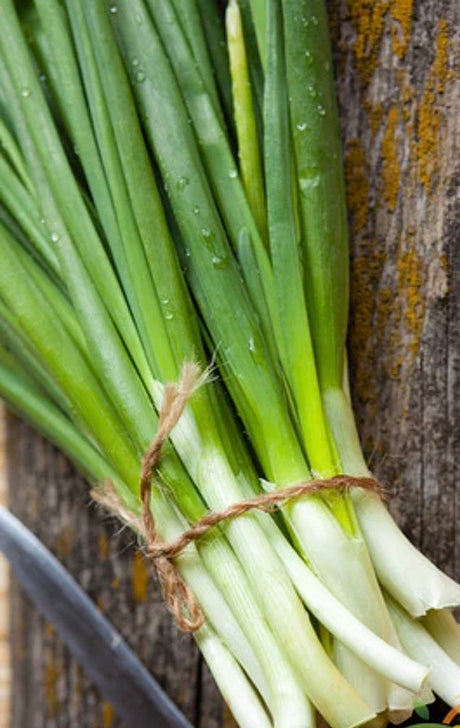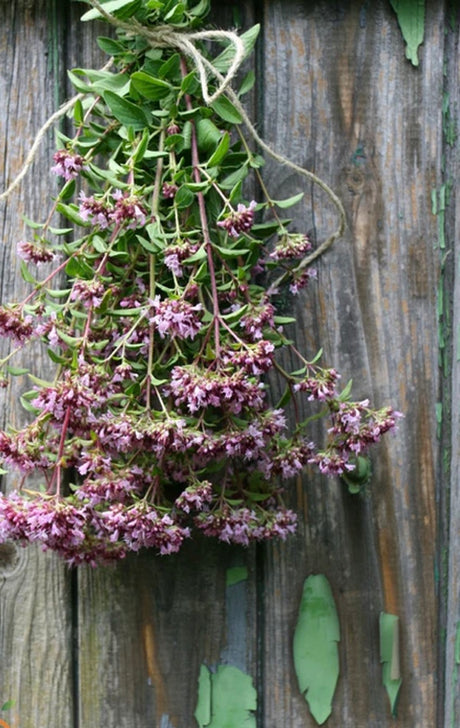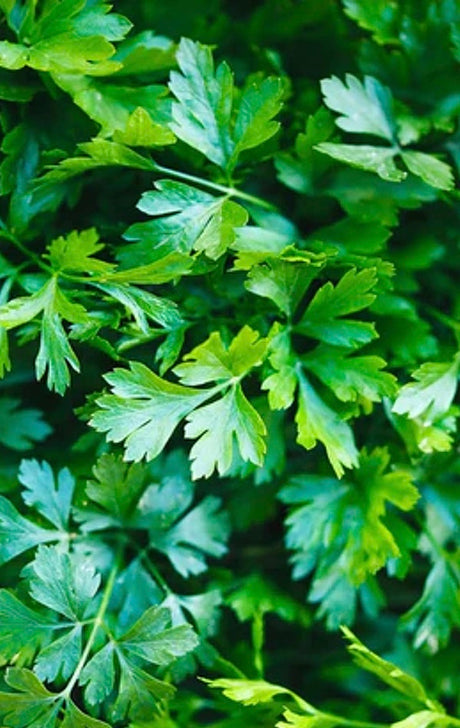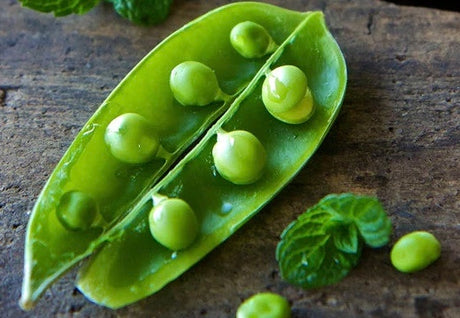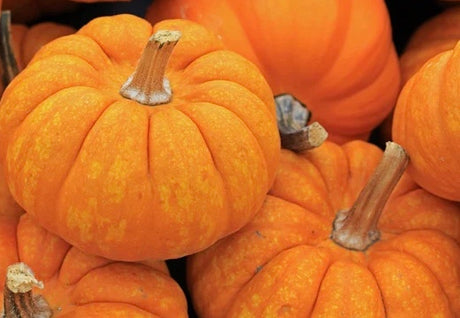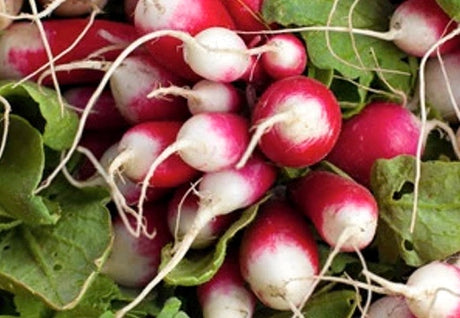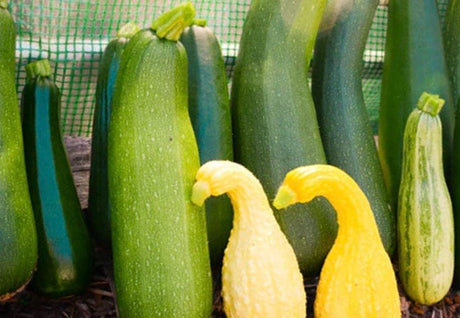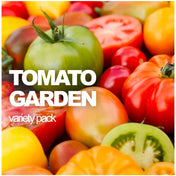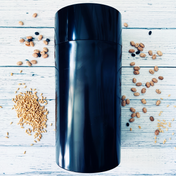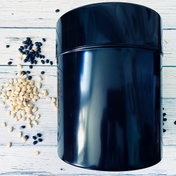- From $399 USDUnit price /Unavailable
Description

The Roma Tomato is the quintessential plum/paste tomato. Light on seeds and juice, it has thick fruit walls and dense flesh that holds onto seasonings and spices. Ever so good cooked into a thick sauce or paste, canned, or pureed. Compact plants produce meaty, egg-shaped fruits that are sweet and tangy. Skip the flavorless ones at the grocery store and grow your own Romas this summer.
- Plum/paste tomato
- Sweet, tangy flavor
- Small seed core
- Not juicy
- Good for containers
SEED PLANTING TIPS
- Botanical name: Solanum lycopersicum
- Growth type: Determinate, tomato cage support, no pruning
- Tomato size: Medium
- Depth to plant seeds: .25" deep
- Spacing between plants: 24" apart
- Spacing between rows: 36"-48" apart
- Days to germinate (sprout): 7-14 days
- Germination soil temps: 75F-95F
- Soil needs: 6.0-6.5 pH
- Sun needs: Full sun
- Frost hardy: No
- Planting season: Spring, summer
- # of plants per sq. ft.: Appx. 1 plant per 2 sq. ft.
- Days to maturity: 75-85 days
Click here to view our full Tomato grow guide
Good companion plants: Basil, Borage, Onion, Parsley, Pepper
Tomato - Tiny Tim (Determinate)
From $399 USDUnit price /UnavailableDescription

The Tiny Tim Tomato could not be more adorable. This dwarf variety grows to only about 12"-18", and thrives in the coziness of a small pot or window box, even indoors in a sunny spot. At 1", the adorable red fruit is smaller than a cherry tomato, so you can get more in a handful. It doesn’t even take much time to produce an adorable harvest—only about 45 days. And the flavor. A little sweet, a little tart. Just so very adorable.
- Early producer
- Sweet, tart flavor
- Good for small spaces
- Good for containers
SEED PLANTING INFO
- Botanical name: Solanum lycopersicum
- Growth type: Determinate, tomato cage support, no pruning
- Tomato size: Small
- Depth to plant seeds: 1/8" deep
- Spacing between plants: 6"-12" apart
- Spacing between rows: 24"-36" apart
- Days to germinate (sprout): 7-14 days
- Germination soil temps: 75F-95F
- Soil needs: 6.0-6.5 pH
- Sun needs: Full sun
- Frost hardy: No
- Planting season: Spring, summer
- # of plants per sq. ft.: Appx. 4 plants per sq. ft.
- Days to maturity: 45 days
Click here to view our full Tomato grow guide
Good companion plants: Basil, Borage, Onion, Parsley, Pepper
Tomato - Delicious (Indeterminate)
From $399 USDUnit price /UnavailableDescription
The Delicious Tomato has been known to produce huge 2-3 lb beefsteak tomatoes. This delightful slicer is solid, meaty, and juicy with a small seed core. No surprise that one of these grew to 7 lb, 12 oz, and held a 28-year world record for largest tomato. The typical size is 1-2 lbs, but stake well in case a record breaker grows on one of your vines.
- Extra large fruit
- Juicy and meaty
- Small seed core
- Delicious flavor
SEED PLANTING TIPS
- Botanical name: Solanum lycopersicum
- Growth type: Indeterminate, trellis support, regular pruning
- Tomato size: Large to Extra-Large
- Depth to plant seeds: .25" deep
- Spacing between plants: 24"-36" apart
- Spacing between rows: 36"-48" apart
- Days to germinate (sprout): 7-14 days
- Germination soil temps: 75F-95F
- Soil needs: 6.0-6.5 pH
- Sun needs: Full sun
- Frost hardy: No
- Planting season: Spring, summer
- # of plants per sq. ft.: Appx. 1 plant per 3 sq. ft.
- Days to maturity: 75-80 days
Click here to view our full Tomato grow guide
Good companion plants: Basil, Borage, Onion, Parsley, Pepper
- From $399 USDUnit price /Unavailable
Description
Catnip is not the most beautiful plant you can grow, but it’s quite useful. The small spikes of white speckled flowers attract pollinators and beneficial insects to the vegetable garden. And the same compound that sends cats flying to the moon also sends mosquitoes flying away. Also repels ants, aphids, cabbage moths, cabbage white butterfly, cabbage worms, potato beetles, cucumber beetles, flea beetles, Japanese beetles, mice, roaches, slugs, squash bugs, voles, and weevils, which makes it a great companion for just about everyone (except Parsley). Reseeds easily and can become invasive. Use the minty leaves to flavor tea, pasta, vegetables, soups, and sauces.
- Mosquito repellent
- Can be invasive
- Grows 2'-3' tall
- Good for containers
As a medicinal herb, Catnip has been used internally to treat anxiety, colds, cough, fever, insomnia, nervousness, restlessness, sore throat, and upset stomach, and externally to treat black eyes and other bruises.⚠️ Medicinal properties are presented as information only, and are not a recommendation or prescription for use. Consult a medical professional before using any herb medicinally.
SEED PLANTING TIPS
- Botanical name: Nepeta cataria
- Life cycle: Herbaceous perennial
- Hardiness zones: 3-9
- Planting season: Spring, fall
- Days to maturity: 75-85 days; can begin harvesting when 6" tall
- Depth to plant seeds: 1/4" deep
- Days to germinate (sprout): 7-14 days
- Germination soil temps: 60F-70F
- Spacing between plants: 18"-24" apart
- Spacing between rows: 24"-36" apart
- # of plants per sq. ft.: Appx. 1 plant per 2 sq. ft.
- Soil types: Sandy, loamy, silty, rocky, poor, rich, dry, moist, well-drained
- Soil pH: 6.0-7.8
- Sun needs: Full sun, part shade
- Water needs: Low
- Cold stratify: Yes
- Frost tolerant: Yes
- Heat tolerant: No
- Drought tolerant: Yes
- Deer resistant: Yes
- Cat resistant: No
- Culinary use: Yes
- Medicinal use: Yes
Good companion plants: Bean, Beet, Broccoli, Brussels Sprouts, Cabbage, Carrot, Cauliflower, Collards, Cucumber, Eggplant, Fava Bean, Hyssop, Kale, Kohlrabi, Lavender, Lettuce, Mustard, Potato, Pumpkin, Radish, Rutabaga, Soybean, Strawberry, Squash, Tomato, Turnip, Zucchini
More facts about Catnip:
- Nepeta cataria. Perennial.
- Classic aromatic scent that is proven to attract cats. They absolutely love to roll around in it.
- Plant produces flavorful leaves that can be used in many culinary dishes and teas.
- Said to have medicinal properties to relieve cold and flu symptoms.
- Catnip is also a VERY effective mosquito repellent.
- According to ScienceDaily.com, nepetalactone, the essential oil in catnip that gives the plant its characteristic odor, is about ten times more effective at repelling mosquitoes than DEET — the compound used in most commercial insect repellents.
-
Simply grow catnip near the backyard or patio of your house.
Tomato - San Marzano (Indeterminate)
From $399 USDUnit price /UnavailableDescription
Can a tomato be a celebrity? Ask the San Marzano Tomato—if you can get past its bodyguards. One commercial grower proclaims it the “gold standard for taste.” Martha Stewart devoted an entire blog post to it. Certified tomatoes from Italy are regulated. It even has its own Wikipedia page. But at the end of the day, it’s still just a tomato. One that’s longer and thinner than other plum/paste tomatoes, with exceptional tomato flavor, meaty and thin skinned for slicing, few seeds and fleshy for saucing, and very high yields. We’ve joined the fan club. How about you?
- Sweet, intense flavor
- Very high yields
- Compact plant
- Good fresh or cooked
SEED PLANTING TIPS
- Botanical name: Solanum lycopersicum
- Growth type: Indeterminate, trellis support, regular pruning
- Tomato size: Medium
- Depth to plant seeds: .25" deep
- Spacing between plants: 24" apart
- Spacing between rows: 36"-48" apart
- Days to germinate (sprout): 7-14 days
- Germination soil temps: 75F-95F
- Soil needs: 6.0-6.5 pH
- Sun needs: Full sun
- Frost hardy: No
- Planting season: Spring, summer
- # of plants per sq. ft.: Appx. 1 plant per 2 sq. ft.
- Days to maturity: 75-90 days
Click here to view our full Tomato grow guide
Good companion plants: Basil, Borage, Onion, Parsley, Pepper
Shungiku, Edible Chrysanthemum
From $399 USDUnit price /UnavailableDescription
- Shungiku, Edible Chrysanthemum is a very versatile asian green
- Known as Shungiku, Edible Chrysanthemum, Garland Chrysanthemum, Chop Suey Greens and many other names
- This is a salad green that can be grown in winter and again in spring
- The flowers of Shungiku can be dried and stored to be used for tea. Often considered a substitute for Chamomile - with its soothing and stomach quieting properties
-
Days to Maturity | 30 - 50 days
- Shungiku, Edible Chrysanthemum is a very versatile asian green
- From $399 USDUnit price /Unavailable
Description

Roman Chamomile, also called English Chamomile, has been cultivated as a medicinal herb since Medieval times. This hardy, aromatic, mat-forming groundcover perennial in the daisy family produces small white flowers with large yellow solid cone centers and aromatic, fern-like foliage. Easily spreads through both reseeding and creeping roots, and can become invasive. Use it to fill in space between stones or pavers, or create a fragrant, low-maintenance “chamomile lawn” like the royals do at Buckingham Palace. Both the apple-scented flowers and stems are used fresh or dried, and steeped into a calming herbal tea sipped before beddy-bye time.
Apple fragrance
Grows 3"-6" tall
Can be invasive
Good for containersAs a companion plant, it attracts pollinators and beneficial insects; repels cabbage moths, cabbage white fly, cabbage worms, cucumber beetles, and mosquitoes; and is said to increase the fragrance and flavor of aromatic herbs such as basil, mint, oregano, rosemary, sage, and thyme.
German Chamomile has many of the same uses as Roman Chamomile, but it’s a tall, bushy annual with more, but smaller flowers. You can determine which type of Chamomile you have if you cut open the yellow center of the flower. German has hollow centers while Roman has solid ones.
As a medicinal herb, Chamomile has been used internally to treat allergies, anxiety, arthritis, asthma, colds, colic, cough, flatulence, gum disease, headache, indigestion, inflammation, insomnia, irritable bowel syndrome (IBS), menstrual cramps, morning sickness, stress, nervousness, restlessness, and stomach upset, and externally to treat burns, earache, hemorrhoids, mouth sores, skin problems, sunburns, teething pain, tired eyes, toothache, and wounds.
⚠️ Medicinal properties are presented as information only, and are not a recommendation or prescription for use. Consult a medical professional before using any herb medicinally.
SEED PLANTING TIPS
- Botanical name: Chamaemelum nobile
- Life cycle: Herbaceous perennial
- Hardiness zones: 4-9
- Planting season: Spring, summer, fall
- Days to maturity: 60-65 days
- Depth to plant seeds: Lightly cover - seeds need light to germinate
- Days to germinate (sprout): 7-14 days
- Germination soil temps: 55F-70F
- Spacing between plants: 6"-9" apart
- Spacing between rows: 18"-24" apart
- # of plants per sq. ft.: Appx. 4 plants per sq. ft.
- Soil types: Sandy, loamy, silty, chalky, shallow, poor, rich, moist, well-drained
- Soil pH: 5.5-7.5
- Sun needs: Full sun, part shade
- Water needs: Low - do not overwater
- Cold stratify: No
- Frost tolerant: Yes
- Heat tolerant: No
- Drought tolerant: Yes
- Deer resistant: Yes
- Culinary use: No
- Medicinal use: Yes
Good companion plants: Basil, Bean, Broccoli, Brussels Sprouts, Cabbage, Carrot, Cauliflower, Chives, Collards, Cucumber, Fava Bean, Garlic, Hyssop, Kale, Lavender, Marigold, Mint, Mustard, Onion, Oregano, Pepper, Parsley, Rosemary, Soybean, Sage, Thyme, Squash, Tomato, Zucchini
More facts about Chamomile:
-
Chamomile helps combat headaches, toothaches, and earaches.
- Sometimes known as "the plant doctor", because it is thought to help the growth and health of many other plants, especially ones that produce essential oils.
-
Thought to increase production of those oils, making certain herbs, like mints (spearmint, sage, oregano) and basil stronger in scent and flavor.
- Can be taken as a herbal tea, two teaspoons of dried flower per cup of tea, which should be steeped for ten to fifteen minutes while covered to avoid evaporation of the volatile oils.
See Chamomile Recipes & Growing Tips on our Pinterest Board
Follow SeedsNow.com's board Chamomile on Pinterest. - From $399 USDUnit price /Unavailable
Description
- The Tatsoi mustard produces dark green spoon shaped leaves
- Popular oriental green
- Excellent for hydroponic systems
- Highly resistant to cold and grows well during the winter months
-
Days to Maturity | 55 days
- Click here for complete Mustard grow guide
Additional DetailsMustard is high in Vitamin A, B, and C. Mustard greens are very popular in the southern U.S. where they are generally slow-cooked with ham hocks or other smoked-pork products. Asian cuisines generally use mustard greens pickled or stir-fried.
- The Tatsoi mustard produces dark green spoon shaped leaves
Tomato - Marion (Indeterminate)
From $399 USDUnit price /UnavailableDescription
The Marion Tomato is the perfect tomato for Southern gardens—tolerant of heat and humidity, resistant to cracking and disease, producing gobs of scarlet globes that ripen mid-season, and with just enough sweetness and acidity to know you’re eating the perfect tomato. A great-tasting and versatile fruit for sauce and paste or salt and pepper.
- Heat tolerant
- Early producer
- High yields
- Good for Southern gardens
SEED PLANTING TIPS
- Botanical name: Solanum lycopersicum
- Growth type: Indeterminate, trellis support, regular pruning
- Tomato size: Medium
- Depth to plant seeds: .25" deep
- Spacing between plants: 24" apart
- Spacing between rows: 36"-48" apart
- Days to germinate (sprout): 7-14 days
- Germination soil temps: 75F-95F
- Soil needs: 6.0-6.5 pH
- Sun needs: Full sun
- Frost hardy: No
- Planting season: Spring, summer
- # of plants per sq. ft.: Appx. 1 plant per 2 sq. ft.
- Days to maturity: 75-80 days
Click here to view our full Tomato grow guide
Good companion plants: Basil, Borage, Onion, Parsley, Pepper
Carrot - Cosmic Purple, 7" Long
From $399 USDUnit price /UnavailableDescription
-
The Cosmic Purple carrot is one of the most beautiful varieties you can grow in your garden.
- A great addition to any culinary creation.
- 7" long and 2" thick with thickly tapered ends
- Tender and very sweet
- Carrots are a sun-loving plants that also like the cold.
-
Day to Maturity | 70 days
- Carrot Seeds | Carrots are an annual cool-season crop, half-hardy to frost and light freezes. Sow seeds evenly in a very shallow furrow, about 1/4 inch deep, and keep seeds moist so they will germinate.
Click here for complete Carrot grow guide
Additional DetailsCarrot gets its characteristic and bright orange colour from β-carotene, which is metabolised into vitamin A in humans when bile salts are present in the intestines. Carrots are also rich in dietary fibre, antioxidants, and minerals.

Follow SeedsNow.com's board Carrots on Pinterest. -
The Cosmic Purple carrot is one of the most beautiful varieties you can grow in your garden.
Spinach - Monstrueux De Viroflay
From $399 USDUnit price /UnavailableDescription
Monstrous Viroflay spinach is a variety of spinach known for its large, dark green leaves and delicious flavor. It is a popular choice among gardeners and spinach enthusiasts due to its impressive size and nutritional value.
This variety of spinach is named after the town of Viroflay in France, where it was first cultivated. It is known for its vigorous growth and ability to produce abundant harvests.
Monstrous Viroflay spinach is rich in vitamins A, C, and K, as well as iron, calcium, and fiber. It is a nutrient-dense leafy green that can be enjoyed in a variety of dishes, including salads, sautés, and smoothies.
One of the key features of Monstrous Viroflay spinach is its size. The leaves can grow up to 10 inches long, making them perfect for salads or as a side dish. The large leaves also make it easier to harvest and prepare the spinach.
When growing Monstrous Viroflay spinach, it is important to provide it with well-drained soil and ample sunlight. This variety thrives in cool weather and can be planted in early spring or late summer for a fall harvest.
Monstrous Viroflay spinach is a versatile and nutritious addition to any garden or kitchen. Its impressive size, delicious taste, and health benefits make it a favorite among spinach lovers.
-
How to Grow | Spinach is very hardy and can tolerate cold — in fact, it thrives in cold weather. Spinach grows really well during winter months in the South. Spinach also grows well in early spring and late summer in the North. These seeds should be planted about four weeks before your area's average date of last frost.
- Days to Maturity | 45 days
-
How to Grow | Spinach is very hardy and can tolerate cold — in fact, it thrives in cold weather. Spinach grows really well during winter months in the South. Spinach also grows well in early spring and late summer in the North. These seeds should be planted about four weeks before your area's average date of last frost.
- From $399 USDUnit price /Unavailable
Description
- These tomatillo seeds will produce delicious 3-5 ounce fruits.
- Tomatillo is popularly used to make salsas.
- Days to Maturity | 85 days
- These tomatillo seeds will produce delicious 3-5 ounce fruits.
- From $399 USDUnit price /Unavailable
Description
- These tomatillo seeds will produce delicious 3-5 ounce fruits.
- Tomatillo is popularly used to make salsas.
- Days to Maturity | 85 days
- These tomatillo seeds will produce delicious 3-5 ounce fruits.
- From $399 USDUnit price /Unavailable
Description
- These tomatillo seeds will produce delicious 3-5 ounce fruits.
- Tomatillo is popularly used to make salsas.
- Days to Maturity | 85 days
- These tomatillo seeds will produce delicious 3-5 ounce fruits.
Sunflower, Chocolate Cherry Flowers
From $399 USDUnit price /UnavailableDescription
Carrot - Solar Yellow, 7" Long
From $399 USDUnit price /UnavailableDescription
The Solar Yellow Carrot (Daucus carota) is a sunny yellow carrot with a crispy crunch and a flavor slightly sweeter than the orange ones. Grows 7" long with a tapered root. Harvest sooner for small carrots. Half-hardy to frost and light freezes.
- Sweet and crunchy
- Size: 7" long
- Days to germinate (sprout): 7-21 days
- Days to maturity: 75-80
Good companion plants: Broccoli, Cauliflower, Chives, Lettuce, Onion, Parsley, Peas, Rosemary, Sage, Thyme, Tomato
SEED PLANTING TIPS
- Depth to plant seeds: .25" deep
- Spacing between plants: 2" apart
- Spacing between rows: 18"-24" apart
- Days to germinate (sprout): 7-21 days
- Germination soil temps: 65F-85F
- Soil needs: 6.0-6.8 pH
- Sun needs: Full sun
- Hardiness: Half-hardy to frost and light freezes
- Planting season: Spring, fall
- # of plants per sq. ft.: Appx. 16 plants per sq. ft.
- Days to maturity: 70-75 days
Lettuce - Marvel of Four Seasons
From $399 USDUnit price /UnavailableDescription

Marvel of Four Seasons lettuce plant, also known as Lactuca sativa, is a popular variety of lettuce that is highly sought after by gardeners and salad enthusiasts. This unique lettuce variety is known for its beautiful red and green leaves, making it a visually appealing addition to any garden or salad bowl.
Marvel of Four Seasons lettuce is a cool-season crop that thrives in mild climates and can be grown in both spring and fall. It is a loose-leaf lettuce variety, which means that the leaves grow in a loose, open head rather than forming a tight, compact head like other lettuce varieties.
One of the key features of Marvel of Four Seasons lettuce is its exceptional taste. The leaves have a delicate, buttery flavor with a slight hint of bitterness, making it a versatile ingredient in salads, sandwiches, and wraps. Its crisp texture adds a refreshing crunch to any dish.
Growing Marvel of Four Seasons lettuce is relatively easy, making it a great choice for both beginner and experienced gardeners. It prefers well-drained soil and requires regular watering to keep the soil moist. This lettuce variety can be grown in containers, raised beds, or directly in the ground.
When planting Marvel of Four Seasons lettuce, it is important to sow the seeds thinly and cover them with a thin layer of soil. The seeds should be spaced about 6 inches apart to allow room for the plants to grow. It is recommended to provide the plants with partial shade to protect them from excessive heat.
Harvesting Marvel of Four Seasons lettuce is a rewarding experience. The leaves can be harvested individually as needed or the entire plant can be harvested at once. To harvest the leaves, simply cut them off at the base using a sharp knife or scissors. The plant will continue to produce new leaves, allowing for multiple harvests throughout the growing season.
Marvel of Four Seasons lettuce is not only a delicious and visually appealing addition to your garden, but it is also packed with nutritional benefits. It is a good source of vitamins A and K, as well as folate and fiber. Adding this lettuce variety to your diet can contribute to a healthy and balanced lifestyle.
Whether you are a seasoned gardener or just starting out, Marvel of Four Seasons lettuce is a fantastic choice for your garden. Its beautiful appearance, delicious taste, and nutritional benefits make it a must-have for any lettuce lover. Start growing your own Marvel of Four Seasons lettuce today and enjoy the satisfaction of harvesting your own fresh, homegrown lettuce.
Click here for our complete Lettuce grow guide- From $499 USDUnit price /Unavailable
Description

Anise (Pimpinella anisum), also called Aniseed, is a sweet, aromatic annual in the parsley family.
The leaves and flowers are lacy, delicate, and delicious, and plants can grow 2'-3' tall.
With a fresh licorice flavor, use as you would Tarragon and Fennel in both savory meat and vegetable dishes, salads and dressings, and sweet baked goods, such as biscotti.
Chew the seeds for a natural breath freshener and digestif. Its aromatic seeds are also used for cooking and herbal medicine.
You may be familiar with the anise flavor if you've had absinthe, as anise seeds are the basis for this famous alcoholic beverage.
- Licorice flavor
- Edible seeds and leaves
- Culinary and medicinal
- Good for containers
As a companion plant, it attracts pollinators and beneficial insects, and repels aphids, cabbage moths, cabbage white fly, cabbage worms, slugs, and snails, but is strangely irresistible to bears, deer, dogs, and mice.
As a medicinal herb, Anise has been used internally to treat bad breath, bloating, constipation, cough, flatulence, hot flashes, indigestion, lack of appetite, migraine headaches, and upset stomach, and externally to treat bronchitis, eye pain, and swelling.
⚠️ Medicinal properties are presented as information only, and are not a recommendation or prescription for use. Consult a medical professional before using any herb medicinally.
- From $499 USDUnit price /Unavailable
Description

Borage, also called Starflower, is a fast-growing flowering herb with bright blue star-shaped flowers and fuzzy stems and leaves, all edible and they taste like cucumber. Grows 1'-3' tall and reseeds liberally, so it can become invasive. Use the young leaves like spinach and the sweet little flowers as a charming garnish on salads and cakes, or frozen into ice cubes. Easy to dry and use as a refreshing herbal tea.
- Cucumber flavor
- Garden companion superstar
- Culinary and medicinal
- Spreads easily
A valuable companion in the vegetable garden, it repels cabbage moths, cabbage white butterfly, cabbage worms, and tomato hornworms; attracts pollinators and beneficial insects; acts as a trap crop for grasshoppers; and feeds the soil as a green manure or mulch.As a medicinal herb, Borage is used internally to treat anxiety, colds, congestion, cough, depression, fever, hot flashes, insomnia, irritable bowel syndrome (IBS), upset stomach, and urinary problems, and externally to treat insect bites and stings, skin irritations, and swelling.
⚠️ Toxic to pets and livestock. Do not ingest while pregnant or nursing, or if you have liver problems.
⚠️ Medicinal properties are presented as information only, and are not a recommendation or prescription for use. Consult a medical professional before using any herb medicinally.
SEED PLANTING TIPS
- Botanical name: Borago officinalis
- Life cycle: Herbaceous annual
- Hardiness zones: 2-11
- Planting season: Spring, summer
- Days to maturity: 55-60 days; can begin harvesting when 6" tall
- Depth to plant seeds: 1/4" deep
- Days to germinate (sprout): 5-14 days
- Germination soil temps: 65F-70F
- Spacing between plants: 12"-18" apart
- Spacing between rows: 18"-24" apart
- # of plants per sq. ft.: Appx. 1 plant per sq. ft.
- Soil types: Clay, sandy, loamy, silty, rocky, chalky, poor, dry, moist, well-drained
- Soil pH: 4.8-8.3
- Sun needs: Full sun, part shade
- Water needs: Average
- Cold stratify: No
- Frost tolerant: Yes
- Heat tolerant: Yes
- Drought tolerant: Yes
- Deer resistant: Yes
- Culinary use: Yes
- Medicinal use: Yes
Good Companion Plants: Basil, Broccoli, Bean, Brussels Sprouts, Cabbage, Cauliflower, Collards, Cucumber, Eggplant, Fava Bean, Kale, Marigold, Melon, Mustard, Pea, Pepper, Pumpkin, Radish, Soybean, Squash, Strawberry, Tomato, Zucchini

Borage is a fairly common herbal remedy that has been used since ancient times. It's best when grown in containers because it is extremely invasive. The flavor of these flowers is crisp and refreshing.


What is Borage?This gorgeous, but highly invasive medicinal herb will boast lovely blue and purple flowers and will get at least 5 feet tall wherever you plant it. Very easy to grow, it will re-seed year after year and will be a lovely piece for your garden. The flavor of the Borage flowers resemble cucumbers... cool and crisp.

Health Benefits of BorageBorage is wonderful and has a great reputation for it's beneficial affect on the mind. It's been used to dispel melancholy and induce euphoria. It's a soothing saline, diuretic herb that helps treat damaged or irritated tissues. The leaves can be used as well as an emollient and expectorant.

Ways to Consume BorageConsume these edible flowers in your favorite fresh salads or as a lovely garnish to any dish! Dry the leaves and flowers to make an herbal tea. Freeze these lovely flowers into ice cube trays. Try adding them to wine, cider, and other fruit drinks. Borage pairs well with all salads, most cheeses, summer-like beverages and even fish. You can even "candy" these flowers and use them as edible decorations on cakes, tarts and ice cream.

See Borage Recipes & Growing Tips on our Pinterest Board
Cucumber - Armenian, White (Metki Serpent Melon)
From $499 USDUnit price /UnavailableDescription
- These Armenian cucumber seeds will produce delicious white cucumbers as long as 30"!
- Bitter-free with excellent flavor
-
Excellent slicer and ideal for salads and many culinary dishes
- Easy to grow
-
Days to Maturity | 65 days
-
Cucumber Seeds | Grow cucumbers where a long, warm growing season, minimum 65 days, can be assured. Plant seeds where there is ample space and vines can sprawl, the simplest way is to plant cucumbers in hills.
Click here for complete Cucumber grow guide
- These Armenian cucumber seeds will produce delicious white cucumbers as long as 30"!
*Seed Starting Soil Pods* (ORGANIC)
From $499 USDUnit price /UnavailableDescription
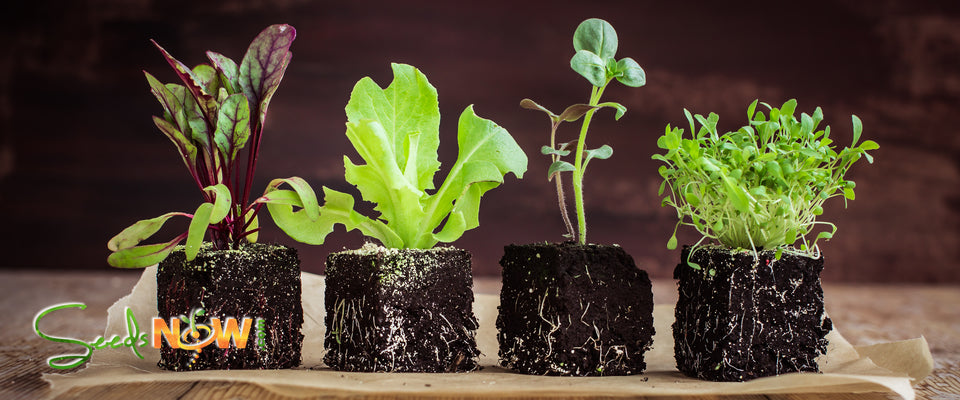
Pods are the easiest way to start your seeds - indoors or outdoors.

- Organic milled Canadian peat and lime added for pH adjustment.
- Just add water to let the soil expand - then add your seeds - and watch them grow.

- When you start plants inside, you raise them to a certain size and then transplant them out into your garden (see transplanting).
- Starting plants inside is very rewarding. All you need to do is add water, add your seeds, and watch them grow.
- Makes seed starting so much easier!
- Provides shock-free transplantation into your garden, container, or pot.
- Organic milled Canadian peat and lime added for pH adjustment.
Pepper (Hot) - Habanero, Chocolate 🔥🔥🔥🔥🔥
From $499 USDUnit price /UnavailableDescription

The Chocolate Habanero Pepper is a prolific plant that produces lots of 2" waxy nuggets that ripen from dark green to reddish brown. Twice as hot as other Habanero peppers, with a distinct flavor. First, a smoky earthiness drives up, then a fruity sweetness hops in the car, and soon you’re off at 600,000 SHUs, entering the on ramp to Ghost Pepper territory. Use it to spice up everything from margaritas to mango salsa to marinated brisket, and yes, even chocolate.- Very high yields
- Smoky, earthy, sweet flavor
- Hot enough to make a leopard lose its spots
- Good for containers
SEED PLANTING TIPS
- Botanical name: Capsicum chinense
- Pepper length: 1"-2"
- Scoville heat units (SHU): 400,00-600,000/extra hot
- Plant support: Tomato cage or stake
- Depth to plant seeds: .25" deep
- Spacing between plants: 18"-24" apart
- Spacing between rows: 24"-36" apart
- Days to germinate (sprout): 10-30 days
- Germination soil temps: 75F-85F
- Soil needs: 5.0-6.0 pH
- Sun needs: Full sun
- Frost hardy: No
- Planting season: Spring, summer
- # of plants per sq. ft.: Appx. 1 plant per sq. ft.
- Days to maturity: 85-105 days
Good companion plants: Basil, Carrot, Cucumber, Eggplant, Okra, Rosemary, Sage, Squash, Tomato
All Peppers ⟐ Hot Peppers 📚 Hot Peppers Grow Guide Pepper (Hot) - Habanero, Lemon 🔥🔥🔥🔥
From $499 USDUnit price /UnavailableDescription

Yellow like the sun and hot as blazes describes the Lemon Habanero Pepper. If that scares you, there’s a Yellow Banana Pepper and a cup of milk waiting for you in the nursery. Everyone else can pull up a chair to the big kids’ table. This prolific plant produces lots of 2" wrinkled, waxy fruits that ripen from bright green to bright yellow to smoky golden yellow. The fruity fragrance draws you in, the citrusy flavor sits you down, and then 200,000-300,000 Scoville heat units (SHUs) of pure heat blaze across your tongue. Where’d you say that milk is again?
- Very high yields
- Fruity and citrusy
- Hot enough to make a cow go meow
- Good for containers
SEED PLANTING TIPS
- Botanical name: Capsicum chinense
- Pepper length: 1"-2"
- Scoville heat units (SHU): 200,000-300,000/very hot
- Plant support: Tomato cage or stake
- Depth to plant seeds: .25" deep
- Spacing between plants: 18"-24" apart
- Spacing between rows: 24"-36" apart
- Days to germinate (sprout): 10-30 days
- Germination soil temps: 75F-85F
- Soil needs: 5.0-6.0 pH
- Sun needs: Full sun
- Frost hardy: No
- Planting season: Spring, summer
- # of plants per sq. ft.: Appx. 1 plant per sq. ft.
- Days to maturity: 85-105 days
Good companion plants: Basil, Carrot, Cucumber, Eggplant, Okra, Rosemary, Sage, Squash, TomatoAll Peppers ⟐ Hot Peppers 📚 Hot Peppers Grow Guide Pepper (Hot) - Habanero, Orange 🔥🔥🔥🔥
From $499 USDUnit price /UnavailableDescription
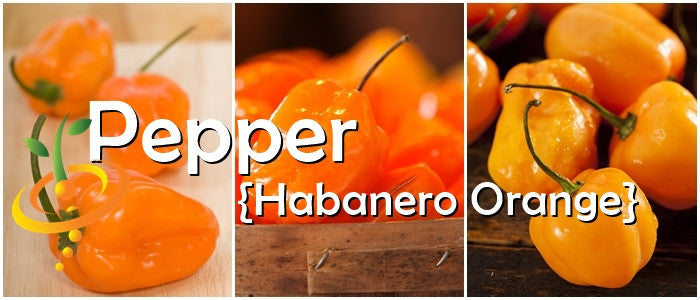
The Orange Habanero Pepper is the kind of pepper that makes you want to check your garden several times a day to see how orange it can get. Very. The kind of pepper that makes you wonder if you can add it to a dish with all orange ingredients like chorizo, carrots, and sweet potatoes. Yes. Or how about with apricots and cantaloupe? Not as hot as other habanero peppers.- Very high yields
- Fruity, citrusy, smoky flavor
- Hot enough to make a lion yelp
- Good for containers
SEED PLANTING TIPS
- Botanical name: Capsicum chinense
- Pepper length: 1"-2"
- Scoville heat units (SHU): 200,000-300,000/very hot
- Plant support: Tomato cage or stake
- Depth to plant seeds: .25" deep
- Spacing between plants: 18"-24" apart
- Spacing between rows: 24"-36" apart
- Days to germinate (sprout): 10-30 days
- Germination soil temps: 75F-85F
- Soil needs: 5.0-6.0 pH
- Sun needs: Full sun
- Frost hardy: No
- Planting season: Spring, summer
- # of plants per sq. ft.: Appx. 1 plant per sq. ft.
- Days to maturity: 85-105 days
Good companion plants: Basil, Carrot, Cucumber, Eggplant, Okra, Rosemary, Sage, Squash, TomatoAll Peppers ⟐ Hot Peppers 📚 Hot Peppers Grow Guide Pepper (Hot) - Habanero, Red Caribbean 🔥🔥🔥🔥🔥
From $499 USDUnit price /UnavailableDescription

The sweet, citrusy flavor, tropical fragrance, and lush green foliage of the Red Caribbean Habanero will remind you of a beach vacation. And so will the searing heat! Produces loads of small 1"-2" wrinkled fruits that twinkle in colors ranging from key lime green to sunrise yellow to sunset orange to sunburn red. Use it to make some haba-haba salsa, broiled halibut with charred pepper cream sauce, or spicy pineapple ice cream.
- Very high yields
- Sweet, citrusy flavor
- Hot enough to make a monkey cough
- Good for containers
SEED PLANTING TIPS
- Botanical name: Capsicum chinense
- Pepper length: 1"-2"
- Scoville heat units (SHU): 300,000-450,000/extra hot
- Plant support: Tomato cage or stake
- Depth to plant seeds: .25" deep
- Spacing between plants: 18"-24" apart
- Spacing between rows: 24"-36" apart
- Days to germinate (sprout): 10-30 days
- Germination soil temps: 75F-85F
- Soil needs: 5.0-6.0 pH
- Sun needs: Full sun
- Frost hardy: No
- Planting season: Spring, summer
- # of plants per sq. ft.: Appx. 1 plant per sq. ft.
- Days to maturity: 85-105 days
Good companion plants: Basil, Carrot, Cucumber, Eggplant, Okra, Rosemary, Sage, Squash, TomatoAll Peppers ⟐ Hot Peppers 📚 Hot Peppers Grow Guide - From $499 USDUnit price /Unavailable
Description
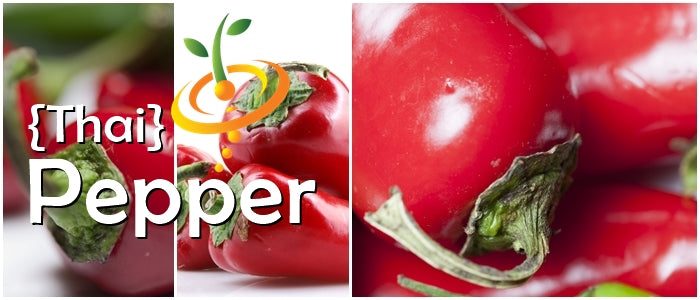
The Thai Hot Pepper hits every type of cuisine with a delightful bolt of lightning. This compact plant throws out lots of slender 1"-3" fruits that grow with their tapered tips up, maturing from popping green to crackling yellow to flashing orange to sizzling red. A type of Bird Pepper, the plant grows to only about 8" tall, so you can plant several close together for a striking ornamental border and more tasty peppers, or interplant throughout the garden.
- High yields
- Drought tolerant
- Edible and ornamental
- Good for containers
SEED PLANTING TIPS
- Botanical name: Capsicum annuum
- Pepper length: 1"-3"
- Scoville heat units (SHU): 50,000-100,000/hot
- Plant support: None
- Depth to plant seeds: .25" deep
- Spacing between plants: 6"-12" apart
- Spacing between rows: 18"-24" apart
- Days to germinate (sprout): 7-21 days
- Germination soil temps: 75F-85F
- Soil needs: 6.0-7.0 pH
- Sun needs: Full sun
- Frost hardy: No
- Planting season: Spring, summer
- # of plants per sq. ft.: Appx. 2-4 plants per sq. ft.
- Days to maturity: 80-90 days
Good companion plants: Basil, Carrot, Cucumber, Eggplant, Okra, Rosemary, Sage, Squash, Tomato
All Peppers ⟐ Hot Peppers 📚 Hot Peppers Grow Guide Sprouts/Microgreens - Clover, Red Crimson
From $499 USDUnit price /UnavailableDescription
- Sweet mild flavor.
- Certified Organic.
- These sprouts are actually larger and more flavorful than alfalfa sprouts and make a great addition to sandwiches and salads.
- If you like Clover sprouts, make sure to check out Alfalfa sprouts.
Did you know? Clover contains high concentrations of isoflavones which are thought to have powerful anti-cancer properties. Clover flavor is a lot like alfalfa; mild and nutty. Sprouts last better if stored in the fridge.- Sweet mild flavor.
- From $499 USDUnit price /Unavailable
Description
- Cress is one of the healthiest and most popular microgreens available.
- Perfect for gourmet salads and many other vegetarian culinary creations.
- Very easy and quick to grow.
- Little space is required to grow cress.
See Cress Sprouts Recipes & Growing Tips on our Pinterest Board
Follow SeedsNow.com's board Cress Sprouts on Pinterest. - Cress is one of the healthiest and most popular microgreens available.
- From $499 USDUnit price /Unavailable
Description
- Wormwood is a very bitter plant with a long history of use as a medicinal herb
- Acts as a natural wasp repellant - many people plant wormwood as a garden border
- It is valued especially for its tonic effect on the liver, gallbladder and digestive system
- It is an extremely useful medicine for those with weak and under-active digestion
- It is known to increase stomach acid and bile production, improving digestion along with the absorption of nutrients
- Days to Maturity | 65 days
Additional DetailsWormwood also eases wind and bloating and, if taken regularly, helps the body return to full vitality after a prolonged illness. Use with caution, the plant should be taken internally in small doses for short-term treatment only, preferably under the supervision of a qualified practitioner. It should not be prescribed for children or pregnant women.
- Wormwood is a very bitter plant with a long history of use as a medicinal herb
- From $499 USDUnit price /Unavailable
Description

Yarrow, Medicinal Herb (100% Heirloom/Non-Hybrid/Non-GMO)- Yarrow has a high reputation and is widely employed in herbal medicine, administered both internally and externally. It is used in the treatment of a very wide range of disorders but is particularly valuable for treating wounds, stopping the flow of blood, treating colds, fevers, kidney diseases, menstrual pain etc.
-
Day to Maturity | 65 days
Pepper (Hot) - Ghost Chili/Bhut Jolokia 🔥🔥🔥🔥🔥🔥🥵 (HYBRID)
From $499 USDUnit price /UnavailableDescription

The Ghost Chili Pepper (Bhut Jolokia) may look like a little wrinkled whoopee cushion, but this pepper is no joke. Native to India, it’s one of the hottest peppers in the world. This 2"-3" conical fruit ripens from green to orange to red, with a sweet, fruity flavor that you’ll be able to taste for about 30-45 seconds until the heat creeps in and lights your mouth on fire. And then it gets really hot for 10-15 minutes, finally subsiding after 30-40 minutes. Take care when handling, as the thin skin tears easily. Use the pepper as you dare.
- This
- Pepper
- Is
- Supercalifragilistically hot
SEED PLANTING TIPS
- Botanical name: Capsicum chinense
- Pepper length: 2"-3"
- Scoville heat units (SHU): 800,000-1,000,000!/smear-it-on-a-fence-to repel-wild-elephants HOT!
- Plant support: Tomato cage or stake
- Depth to plant seeds: .25" deep
- Spacing between plants: 18"-24" apart
- Spacing between rows: 24"-36" apart
- Days to germinate (sprout): 7-28 days
- Germination soil temps: 75F-85F
- Soil needs: 6.0-7.0 pH
- Sun needs: Full sun
- Frost hardy: No
- Planting season: Spring, summer
- # of plants per sq. ft.: Appx. 1 plant per sq. ft.
- Days to maturity: 90-110 days
Good companion plants: Basil, Carrot, Cucumber, Eggplant, Okra, Rosemary, Sage, Squash, Tomato
- HYBRID - Open-Pollinated/Non-GMO
All Peppers ⟐ Hot Peppers 📚 Hot Peppers Grow Guide Cucumber - Cucamelon, West Indian Burr Gherkin
From $499 USDUnit price /UnavailableDescription

-
Also known as: known as Cackrey, Maroon Cucumber, West Indian Gherkin, and West Indian Gourd.
- Incredibly small, cucumber-shaped fruits.
- The surface of these tiny fruits are covered with spine-like warts, while the flesh is pale green.
- Easy to grow for everyone, sells great at farmers markets!
- Can be cooked or eaten raw. The flavor is similar to that of other more traditional cucumbers.
-
Days to Maturity | 55 - 65 days
-
Also known as: known as Cackrey, Maroon Cucumber, West Indian Gherkin, and West Indian Gourd.
Carrot - Heritage Rainbow Blend
From $499 USDUnit price /UnavailableDescription
-
The Heritage Rainbow Blend is a mix of different colored carrots.
- 7" long and 2" thick with thickly tapered ends
- Tender and very sweet
- Carrots are sun-loving plants that also like the cold.
-
Days to Maturity | 70 days
- Carrot Seeds | Carrots are an annual cool-season crop, half-hardy to frost and light freezes. Sow seeds evenly in a very shallow furrow, about 1/4 inch deep, and keep seeds moist so they will germinate.
Click here for complete Carrot grow guide
Additional Details
Carrot gets its characteristic and bright orange colour from β-carotene, which is metabolised into vitamin A in humans when bile salts are present in the intestines. Carrots are also rich in dietary fibre, antioxidants, and minerals.

Follow SeedsNow.com's board Carrots on Pinterest. -
The Heritage Rainbow Blend is a mix of different colored carrots.
Pepper (Hot) - Habanero, White 🔥🔥🔥🔥
From $499 USDUnit price /UnavailableDescription

The White Habanero Pepper produces lots of small 1"-2" fruits, all of them infused with smoky, sweet flavor and a heat like white lightning. These little thunderbolts start out green and ripen to a glossy pearl. Use them to wake up a pot of white bean chicken chili or add a flash of fire to a jar of mayonnaise.- Very high yields
- Sweet, citrusy flavor
- Hot enough to make a monkey cough
- Good for containers
SEED PLANTING TIPS
- Botanical name: Capsicum chinense
- Pepper length: 1"-2"
- Scoville heat units (SHU): 100,000-300,000/very hot
- Plant support: Tomato cage or stake
- Depth to plant seeds: .25" deep
- Spacing between plants: 18"-24" apart
- Spacing between rows: 24"-36" apart
- Days to germinate (sprout): 10-30 days
- Germination soil temps: 75F-85F
- Soil needs: 5.0-6.0 pH
- Sun needs: Full sun
- Frost hardy: No
- Planting season: Spring, summer
- # of plants per sq. ft.: Appx. 1 plant per sq. ft.
- Days to maturity: 85-105 days
Good companion plants: Basil, Carrot, Cucumber, Eggplant, Okra, Rosemary, Sage, Squash, Tomato
All Peppers ⟐ Hot Peppers 📚 Hot Peppers Grow Guide - From $499 USDUnit price /Unavailable
Description
Epazote (Dysphania ambrosioides) is a culinary herb with a lemony green color and serrated leaves, traditionally used to add a bold umami-type depth to Mexican cuisine. Its flavor has been described as a mix of mint and savory with a bit of camphor or turpentine thrown in. An acquired taste. As a companion plant, it attracts beneficial insects and masks the scent of other plants that suffer from pest damage. Also used medicinally to help with stomach upset and to combat intestinal parasites. Can become invasive, so best grown in a container.
- Easy to grow
- Culinary and medicinal uses
- Days to germinate (sprout): 5-7 days
- Quick maturity—only 40 days
Shiso, Green (Perilla Leaf, Japanese Basil)
From $499 USDUnit price /UnavailableDescription
Green Shiso (Perilla frutescens), also called Perilla Leaf and Japanese Basil, is an herb in the mint family with large, bright green, wrinkled, serrated leaves. Not as spicy as Red Shiso. Used extensively in Japanese cuisine, it has a fresh minty-basil flavor with notes of clove and cumin, and a bitter, astringent finish. Pairs well with fish, rice, noodles, and vegetables, especially cucumbers. Also a medicinal herb with antioxidant, anti-bacterial, anti-inflammatory, and antiseptic properties. Its rhizome root can become invasive, so best grown in a container.
- Mint-basil-clove-cumin flavor
- Full sun
- Days to germinate (sprout): 7-21 days
- Days to maturity: 80-85 days
Good companion plants: Arugula, Basil, Bok Choy, Parsley, Tomato
Shiso, Red (Perilla Leaf, Japanese Basil)
From $499 USDUnit price /UnavailableDescription
Red Shiso (Perilla frutescens), also called Perilla Leaf and Japanese Basil, is an herb in the mint family with large, deep purple, wrinkled, serrated leaves. Much stronger and spicier than Green Shiso, the crunchy leaves are used mainly in salads, for pickling, and as a natural food coloring. Used extensively in Japanese cuisine, it has a fresh minty-basil flavor with notes of clove and cumin, and a bitter, astringent finish. Pairs well with fish, rice, noodles, and vegetables, especially cucumbers. Also a medicinal herb with antioxidant, anti-bacterial, anti-inflammatory, and antiseptic properties. Its rhizome root can become invasive, so best grown in a container.
- Mint-basil-clove-cumin flavor
- Full sun
- Days to germinate (sprout): 7-21 days
- Days to maturity: 80-85 days
Good companion plants: Arugula, Basil, Bok Choy, Parsley, Tomato
Sunflower, Velvet Queen Flowers
From $499 USDUnit price /UnavailableDescription
The Velvet Queen Sunflower (Helianthus annuus) is a striking annual plant known for its vibrant, deep red to burgundy petals and dark centers. This variety is not only visually appealing but also serves as a valuable addition to any garden, attracting pollinators such as bees and butterflies. Understanding the optimal conditions and care required for growing Velvet Queen Sunflowers can enhance your gardening experience and yield impressive results.
To begin, it is essential to select an appropriate location for planting. Velvet Queen Sunflowers thrive in full sun, requiring at least six to eight hours of direct sunlight each day. The soil should be well-draining, rich in organic matter, and have a pH level between 6.0 and 7.5. A soil test can provide valuable insights into nutrient levels and pH, allowing for necessary amendments before planting.
Planting should occur after the last frost date in your area, as these sunflowers are sensitive to cold temperatures. Seeds can be sown directly into the garden bed or started indoors and transplanted later. When sowing seeds, plant them approximately 1 inch deep and spaced 12 to 18 inches apart to allow for adequate growth. If starting indoors, transplant seedlings when they are about 6 inches tall and have developed a few sets of true leaves.
Discover the beauty of Sunflower Velvet Queen Flowers in your garden. With its vibrant colors and easy-to-grow nature, you can enjoy 100% success rate in a variety of climates. Perfect for adding a touch of cheer and elegance to any outdoor space.
Sprouts/Microgreens - Broccoli
From $699 USDUnit price /UnavailableDescription

- An easy to grow sprout that is extremely nutritious.
- Broccoli sprouts are 10x - 100x higher in some cancer fighting compounds than the actual mature vegetable!
- Certified Organic.
- Days to Maturity | 2-3 days
- An easy to grow sprout that is extremely nutritious.
*NEW!* All-in-One Garlic Garden Variety Pack
From $1345 USD$1794Unit price /UnavailableDescription
NEW! All-in-One Garlic Variety Pack includes an assortment of our 6 most popular garlic varieties. ⓘ Learn the difference between hard-neck and soft-neck
Includes all of the following 6 varieties:
1. Garlic - (Soft Neck) Elephant
- The cloves are very easy-peeling. You'd think you have a giant hard-neck here, but the bulbs keep very well, more like a soft-neck. Elephant Garlic is also popular and profitable market gardeners' crop in some areas.

2. Garlic - (Soft Neck) Inchelium Red (Organic)
- From Inchelium, WA, on the Colville Indian Reservation! The bulbs are large - to 3+ inches in diameter. 8-20 cloves of good size. Mild, but lasting, flavor, with a hint of hot! Dense cloves store well. The flavor can get stronger in storage. This vigorous soft-necked variety won a Rodale taste test of 20 garlic strains - named \"Very Best of the Soft-Necks\"

3. Garlic - (Soft Neck) California Early (Organic)
-
California Early is very adaptable to any climate, and easy to grow. This variety has one of the longest storage life. Flavor is very mild.

4. Garlic - (Soft Neck) Silver Rose (Organic)
-
This heirloom garlic has medium to large bulb. Rose-colored cloves in very smooth bright-white bulbs. Mild flavor.
Beautiful garlic to braid!
The longest-storing garlic we sell.
Fast-growing garlic.
Very popular in western and southern US and in France and Italy.

5. Garlic - (Soft Neck) Nootka (Organic)
-
This heirloom garlic has medium to large bulb. Beautifully bright white skin with light rose-colored streaked cloves Very attractive for braiding. Excellent flavor. Strong flavor. In rich soil, cloves can lose their rosy hue. This variety of garlic has long shelf-life and will store well into next spring or even summer.

6. Garlic - (Soft Neck) Italian Late (Organic)
- Light colored wrappers covering cloves which are generally fat and round. The extra-tight skin makes it a better keeper. This variety matures later than Early Italian Purple and tends to be somewhat smaller then Early Italian Purple as well. Good braiding type.
- The cloves are very easy-peeling. You'd think you have a giant hard-neck here, but the bulbs keep very well, more like a soft-neck. Elephant Garlic is also popular and profitable market gardeners' crop in some areas.
*NEW!* Vine Teepee Variety Pack
$2999 USDUnit price /UnavailableDescription
NEW! Vine Teepee Garden Variety Pack includes an assortment of our 10 most popular seed varieties that climb, up a vine!
Vine teepees add a whimsical touch to your garden. They are not only fun to look at but are extremely functional because they save space in the garden by using vertical gardening techniques. You'll be able to grow more using less space.
You can build teepees using free materials such as old branches from a nearby tree, which makes them even more desirable! Free garden projects are always a bonus. You can also use bamboo or other wooden stakes that you may have access to!
These seed varieties all wonderful to plant around your teepee and will thrive on a structure like this.
Includes: 
1. Bean, Lima/Pole - King of the Garden
With a name like King of the Garden Lima Bean, you can expect great things. This pole bean produces prolific yields of 7" pods full of large white lima beans with sweet, smooth flavor. Vines can grow 9'-10' high. Will continue to blossom and produce throughout the hot summer months. Cook them before you eat! Appx. 10 seeds

The Rattlesnake Pole Bean is as delicious as it is beautiful. Long purple-and-green streaked pods dangle from strong 10' vines, with streaked beige beans inside. Like its namesnake, it’s not bothered by heat, humidity, or drought. If you hear it rattle, it has probably dried on the vine. Grow alongside other streaked beans, like Tongue of Fire and Borlotti. Appx. 20 seeds

3. Bean, Runner/Pole - Scarlet Runner
The Scarlet Runner Pole Bean is just about as traditional a vegetable you can grow in your garden. Named for its showy red hummingbird attractors (flowers) it puts out on 6'-8' vines that will grow on fences, trellises, and yes, poles. This high-yielding runner bean produces foot-long pods with speckled red-purple beans, but pick them sooner for best flavor. Tolerates heat and drought, and doesn’t mind cool nights.

The Ever-bearing cucumber is one of the most popular cucumbers you can grow. As its name implies, this cucumber variety continues to grow as its fruits are picked. Crisp fruit with excellent flavor and crunch. Vigorous vines loaded with fresh cucumbers all season. Great for table use, slicing, pickling and/or processing. Appx. 10 seeds

The Straight Eight cucumber variety is a popular heirloom type of cucumber ideal for slicing and/or for eating fresh right off the vine. They're great when eaten fresh or used in salads. Pick them off the vine as soon as they are 8" long. Easy to grow and excellent flavor. Appx. 10 seeds

6. Cucumber - Tendergreen Burpless
The Tendergreen Burpless cucumber variety is extremely sweet and tender. Produces medium sized green fruits. Pick when they grow to 8". Also used for pickling if picked less than 8". Appx. 10 seeds

7. Nasturtium - Tall Trailing Mix Flowers
This fast-growing, vine-like or "trailing" plant can easily reach 10 feet in length by the end of the growing season! Perfect for growing along fences, or above retaining walls. It boasts colorful flowers in many shades of yellow, orange and even occasionally red. Appx. 15 seeds

The Green Arrow Pea (Pisum sativum) is an old English heirloom shelling pea. A semi-dwarf frost-tolerant bush variety that grows to only 2'-3' tall and doesn't require staking. High yields for a compact plant. Produces lots of 4"-5" pods with 9-11 plump, tender, sweet peas inside. Delicious fresh or cooked, if you don’t eat them all before you make it into the house. Appx. 15 seeds

9. Pea (Snow) - Mammoth Melting Sugar
This popular pea variety is sweet, sugary and tender. This edible pod snow pea has made its place in home gardens for many years. These pea pods are some of the biggest (appx. 4-5"). Makes for an excellent addition to stir fry. Big white flowers are an bonus as they quickly turn into tasty peas. This pea has been so successful it has been considered a commercial variety for generations. Appx. 15 seeds

10. Gourd - Luffa
Luffa Gourds are an all-time favorite variety for many gardener's. If you know what a gourd is and you like to use a luffa then you're going to love growing your own. You can grow your own luffa gourds and do all these great things with them: exfoliate skin; make your own luffa slippers for the beach; use it to scrub glassware & non-stick pans. Grows on a vine and easy to grow! Appx. 10 seeds
☞ Want to learn more? Constructing a vine teepee is easy and requires only a few materials!
-
How to make a vine teepee:
https://www.seedsnow.com/blogs/news/13179009-how-to-make-a-bean-teepee
-
Learn more about vine teepees:
https://www.seedsnow.com/blogs/news/28484993-how-to-build-a-vine-tee-pee
-
How to make a vine teepee:
All-in-One Chicken Garden Variety Pack
$3999 USDUnit price /UnavailableDescription
100% Non-GMO, Pure Heirloom, Soy and Corn FREE Treats For Your Backyard Chickens That You Can Grow At Home
••●•• Heal your Chickens, Naturally ••●••
 Sariann I. wrote us and said:
Sariann I. wrote us and said:
"I've been growing & feeding fresh herbs/sprouts with seeds we've purchased from your company to our backyard chickens. They've never been so happy or healthy! All of our hens love receiving these fresh treats that we are able to grow in our vegetable garden and then share with them to enhance their health, deter pests, increase laying production & "spruce up" their coop and nesting boxes with an aromatic herb or two. Feeding our chickens these herbs has cut our feed costs by up to half! We never felt right about feeding our chickens soy or GMO corn feed. We love being able to provide our chickens with healthy & organic herbs that we've grown especially for them!"
Includes all of the following 15 varieties:

1. Alfalfa Sprouts (appx. 4,000 seeds)
- These greens are very good for your chickens can be part of a healthy diet. Don't forget that feeding your chickens will up their protein intake! Also, feeding them alfalfa is linked to increased pigmentation, which means layers will produce eggs with more deep orangey yolks.

2. Borage (appx. 65 seeds)
- The leaves may be harvested at anytime and can be used dried or fresh. The plant is best consumed fresh, right after harvest if you're looking for it's characteristic flavor, similar to that of a cucumber. Placing borage around your coop or hen house will deter pests. Very high in calcium, borage is like a powerhouse for supporting their cardiovascular system.
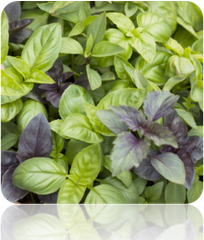
3. Basil Mix (appx. 120 seeds)
-
Antibacterial, mucus membrane health. Can be used to brew an "herbal tea" for new chicks for a healthy start. Is wonderful when dried and added to nesting boxes. When growing basil, as soon as you see flowers start to appear, make sure you pinch or snip them off. This will help the plant stay focused on producing leaves and will encourage the plant to "branch out" as well. Once your basil plant is about 6 inches tall, start pinching off the tops to encourage branching.

4. Cilantro (appx. 80 seeds)
-
If you want to support your chickens bones, feeding them cilantro is a wonderful and natural way to do that. High in vitamin K and A. Acts as a fungicide and contains many beneficial antioxidants. Harvest the cilantro leaves around the base of the plant. Just make sure the plant is fairly established before you start harvesting so it will be able to handle the stress and recover as it continues to grow. Once the flowers have gone to seed, start to re-sow more seeds. That way you won't run out and have a continual harvest of fresh cilantro on your hands. You can harvest the leaves or the entire plant at once.

5. Dill (appx. 100 seeds)
-
Very beneficial to your chickens respiratory health, fresh dill can be fed to your chickens. Try drying and then hanging it near or inside of the nest boxes. It aids in the laying process because it is a natural sedative. When you're ready to harvest, look for the dark green leaves, otherwise known as "dill weed". You can harvest the leaves at any time. The young leaves tend to have better flavor.

6. Fennel (appx. 100 seeds)
-
Recognized as a laying stimulant. Add some freshly cut fennel foliage to your nesting boxes or shaved Fennel bulb to your chickens feed to ensure fresh eggs, year round. Harvest the bulbs when they are approximately the same size as a tennis ball. Once the plant bolts, the flavor will be ruined so try to harvest it before them. Cut the bulb and stalks off right at the soil line.

7. Lemon Balm (appx. 80 seeds)
-
Ward off stress with this this antibacterial and aromatic herb. It makes for a wonderful rodent repellent. It calms their nerves, and smells wonderful in the coop. Hang this fresh herb to dry and then add to nesting boxes to sooth and relax your chickens. Harvest leaves from your lemon balm plant at any time. Dry indoors upside down, chop and store for later use.

8. Lemon Grass
-
Fly repellent. Similar to "citronella" in scent. The long, grassy leaves should be collected by snipping them off with scissors anywhere from mid summer on.
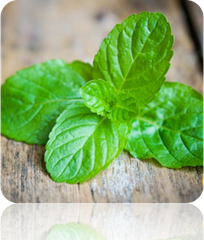
9. Mint, Spearmint (appx. 280 seeds)
-
Repel insects and rodents with this powerful, aromatic herb. It has been known to aid in regulating body temp., produce stronger egg shells, and helps with the chickens digestive system. Pick the leaves as you need them or harvest a large amount from each mint plant up to three times in one growing season. Cut the stems 1-2 inches from the ground. You can take cuttings from the plants you already have and root them in a little bit of water and then plant them indoors for fresh leaves throughout the winter. If you want to dry the leaves, it's best to harvest them before the plant goes to seed.
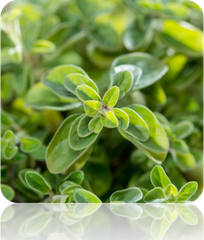
10. Oregano, Greek (appx. 200 seeds)
-
Combats many diseases like coccidia, salmonella, and e-coli. It can ward off the dreaded avian flue. Oregano naturally strengthens the immune system. Harvest oregano anytime after they have reached 4-6 inches tall. Harvest oregano leaves in the morning hours as soon as the dew has dried for best flavor. Once harvested, use fresh or store leaves whole, placed in freezer bags and frozen. They can also be dried in a dark, well-ventilated area and stored in airtight containers until ready to use.

11. Parsley, Dark Green Italian (appx. 60 seeds)
-
High in many necessary vitamins and minerals that are required for optimal chicken health. Helps blood vessel development and has been known to be a great stimulant for laying. Harvest your parsley once the leaves begin to curl. Pick the leaves earlier in the day when the oils are the strongest. You can store the sprigs of parsley in a jar with a little bit of water in the bottom, inside the refrigerator for later use.
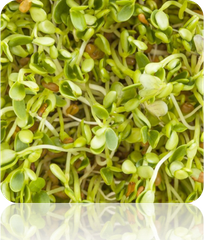
12. Broccoli Sprouts
-
These sprouts are actually larger and more flavorful than alfalfa sprouts and make a great addition to what you feed your chickens. Your chickens be so happy eating broccoli sprouts.
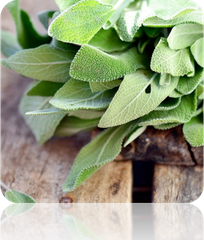
13. Sage (appx. 25 seeds)
-
Feed your chickens sage to increase overall health. This herb can also combat disease and is an anti-parasitic. Smells wonderful in the coop. Store in an airtight container, in a cool and dry place.

14. Lettuce - All Year (appx. 200 seeds)
-
As its name suggests, this is a lettuce that can be gown throughout the year, though it will require protection with a cloche or cold frame in the cooler months. The 'All Year Round' lettuce is a classic Butterhead lettuce, with medium sized loosely formed heads and soft, buttery-textured green leaves.

15. Lettuce - Romaine, Classic "Paris Island Cos"
-
Large, upright, full-bodied heads with dark-green, slightly savoyed leaves that are mild and sweet. Because of their higher chlorophyll content, romaine lettuces are among the most nutritious of all lettuces. Excellent performer in the inter-mountain region. Mosaic tolerant.
All-in-One Fall/Winter Variety Pack
$3999 USDUnit price /UnavailableDescription
100% Non-GMO, Pure Heirloom Seeds For Your Backyard That You Can Grow During the Fall/Winter Months
1. Arugula - Roquette (appx. 150 seeds)
- Arugula can usually be harvested as early as 4 weeks after planting. The leaves of the Arugula plant add a tangy/peppery flavor to any meal. This variety of Arugula is an "easy-to-grow" green. Plant in the spring, and again in the fall. Arugula is one of the easiest leafy greens you can grow. Arugula is very rich in vitamin C and potassium. It's been referred to as an aphrodisiac, and used commonly as a "leaf vegetable". The young seed pods, flowers, leaves and mature seeds are all edible.
2. Basil - Italian Large Leaf (appx. 120 seeds)
-
The Italian Large Leaf Basil plant will produce medium to large leaves that can measure up to 4" long! It is of heriloom variety and is extremely fragrant and used widely in the culinary industry. If you're a lover of basil, this would be a good variety to plant in your garden.
3. Broccoli, Calabrese (appx. 50 seeds)
-
This popular broccoli variety produces a short, 24 inch plant with medium-large heads. Withstands cold well. Best used for a fall crop. Extremely flavorful heads of broccoli ‘Calabrese’ is an old Italian heirloom variety that sprouts side shoots that will mature for harvesting. Once the main head is cut off the plant will continuously produce many broccoli shoots during the season Great for fall planting.
4. Brussels Sprouts (appx. 15 seeds)
- Brussels Sprouts generally take about 3 months until they are ready to harvest. The sprouts will mature from the bottom up.
5. Carrot, Tendersweet 7" (appx. 160 seeds)
-
One of the sweetest and best tasting carrots you can grow! - Skinny 7" tapered roots - Easy to grow - Carrots are a sun-loving plants that also like the cold. - Just keep them consistently watered and they'll be happy.
6. Cauliflower, All-Year-Round (appx. 70 seeds)
-
This Cauliflower variety produces large white heads and surrounded by dark green leaves. Continues to grow well for a long time. Suitable for successional sowing all year round!
7. Cilantro/Coriander - Slow Bolt Splits (appx. 80 seeds)
-
This slow-bolting strain is grown primarily for its broad, deep green, celery-like, pungent foliage. Used in Oriental and Mexican cuisine. Use seed to flavor meats, pickles and baked goods.
8. Mustard - Tendergreen (appx. 100 seeds)
-
A traditional Southern favorite. Plant produces good yields of green mustard leaves. Excellent flavor. Makes a great garnish to any dish. Easy to grow.
9. Kale, Blue Curled Scotch (appx. 50 seeds)
-
The Blue Curled Scotch is an early Kale variety which will produce tasty greens! Excellent in salads or steamed. The blue-green leaves are finely curled and reach up to 12-15" tall! Can handle the cold extremely well. One of the best frost resistant kale varieties available.
10. Lettuce, Gourmet Mesclun Mix (appx. 200 seeds)
-
A mixture of favorite lettuce seed varieties from across the spectrum of lettuce types. Plant heavy and start harvest early for young for baby greens then allow some to grow on for plenty of variety for salads. A great way to get a lot out of little space. Perfect for container gardening.
11. Onion, Evergreen (Scallion) (appx. 100 seeds)
-
Allium cepa. This plant produces very long and slender bunching onions. Grown exclusively as green bunching onions. Onions have white shanks and white skin making it a very attractive scallion for gourmet dishes. A hardy plant that can withstand cold weather. If you like scallions, you'll love this variety. Extremely popular. A must have for any onion-lover!
12. Onion - Barletta, Pearly White (appx. 100 seeds)
-
The Barletta, Pearly White Onion is an extremely tasty small pearl-sized onion. Barletta onions are beautiful silver white pickling onions. So delicious! Perfect for shish-ka-bobs, chicken and veggie skewers, and even just grilled on the bbq. Grows well in containers and small spaces. Easy to grow.
13. Onion - Red Burgundy (Short Day) (appx. 100 seeds)
- The Red Burgundy onion plant produces beautiful 4" wide red onions. Short day. These onions have a mild but very sweet flavor. Excellent slicing variety.
14. Radish, Pink Beauty (appx. 160 seeds)
- Produces beautiful pink radishes with a white flesh. Looks amazing! Great for culinary dishes. The white flesh is crisp and mild in flavor. Great for selling at farmers markets. Unique and rare heirloom radish. Grows well in containers and small spaces.
15. Spinach, Bloomsdale (appx. 70 seeds)
- Spinach is very hardy and can tolerate cold — in fact, it thrives in cold weather. Spinach grows really well during winter months in the South. Spinach also grows well in early spring and late summer in the North. These seeds should be planted about four weeks before your area's average date of last frost. Bloomsdale Spinach will produce heavy, glossy, dark green leaves. Excellent flavor. Extremely easy to grow. Large, curly dark green leaves.
- Arugula can usually be harvested as early as 4 weeks after planting. The leaves of the Arugula plant add a tangy/peppery flavor to any meal. This variety of Arugula is an "easy-to-grow" green. Plant in the spring, and again in the fall. Arugula is one of the easiest leafy greens you can grow. Arugula is very rich in vitamin C and potassium. It's been referred to as an aphrodisiac, and used commonly as a "leaf vegetable". The young seed pods, flowers, leaves and mature seeds are all edible.
All-in-One Culinary Herb Garden Variety Pack
$3999 USDUnit price /UnavailableDescription
Grow an indoor or outdoor culinary herb garden with your favorite herbs. Herbs will do well in a variety of locations, especially in containers. This variety pack is perfect for those who want to grow fresh herbs throughout the cooler months on their covered decks, patios and even indoor windowsills. This All-in-One Herb Variety Pack includes an assortment of our 15 most popular varieties. Seeds are all individually packaged.
Includes all of the following seed varieties:
1. Basil - HERB MIX (appx. 120 seeds)
Enjoy some of our most popular varieties of Basil Herbs. This is a special blend of basil varieties we carry, sure to be a show stopper! You'll enjoy a wide variety of Basil plants with great flavors! Very easy to grow and extremely popular for those that can't decide on which variety to try in their own garden! Learn more
2. Basil - Leaf Lettuce (appx. 120 seeds)
Annual plant. Produces very flavorful and tender basil leaves. Used in many different types of dishes. Leaves can be used dried, fresh, or frozen. 85 days to mature. Can be grown indoors in containers. Very easy to grow! Learn more3. Borage (appx. 65 seeds)
Borage is a fairly common herbal remedy that has been used since ancient times. It's best when grown in containers because it is extremely invasive. The flavor of these flowers is crisp and refreshing. Learn more4. Chives (appx. 115 seeds)
Also known as Garlic Chives. A perennial plant that grows narrow, grass-like leaves that have a mild onion-like flavor. Chives are rich in vitamins A and C, contain trace amounts of sulfur, and are rich in calcium and iron. Learn more
5. Cilantro (appx. 80 seeds)
This slow-bolting strain is grown primarily for its broad, deep green, celery-like, pungent foliage. Used in Oriental and Mexican cuisine. Use seed to flavor meats, pickles and baked goods. Learn more
6. Chervil - French Parsley (appx. 100 seeds)
Chervil, aka French Parsley, has many various traditional uses. Chervil is "a delicate annual herb related to parsley. It is commonly used to season flavored dishes." Learn more7. Fennel (appx. 100 seeds)
Produces very flavorful large bulbs and edible flower buds. Excellent for seasonings and for cooking as a vegetable. Plant Height: 30" tall. Fennel is a very aromatic plant with a sweet licorice flavor, similar to an anise seed. It has many medicinal uses and herbalists have been using it for centuries to relieve problems with the respiratory system, stomach muscles and intestines. Nursing mothers can expect increased milk production and fennel also has been used to soothe colicky infants. Learn more8. Lavender (appx. 50 seeds)
English Lavender is one of the most beautiful seeds you can plant in your garden.- Lavender is an herb. The flower and the oil of lavender are used to make medicine.- Lavender is used for restlessness, insomnia, nervousness, and depression. It is also used for a variety of digestive complaints, loss of appetite, vomiting, nausea, intestinal gas, and upset stomach.- Some people use lavender for painful conditions including migraine headaches, toothaches, sprains, nerve pain, sores, and joint pain. It is also used for acne and cancer, and to promote menstruation. Learn more9. Mint, Lemon (appx. 100 seeds)
Annual plant that is covered with beautiful pinkish purple colored flowers. - Lemon scented leaves that can be used as a replacement for lemon in any dish! Learn more10. Oregano, Greek (appx. 200 seeds)
Hippocrates used oregano as an antiseptic, as well as a cure for stomach and respiratory ailments. It is still used today in Greece as a palliative for sore throat. Oregano is also high in antioxidant activity, due to a high content of phenolic acids and flavonoids. Learn more11. Parsley, Dark Green Italian (appx. 60 seeds)
Finely cut dark green leaves. Flat leaves. Use this parsley for garnishing, and culinary decoration. Tolerates heat better than most varieties. Learn more12. Rosemary (appx. 20 seeds)
Excellent flavor and extremely fragrant. Perfect to use fresh or dried. Can be used to flavor many culinary varieties such as meats, soups, and sauces. Can be used for treating headaches and known to improve circulation. Perfect for containers. Learn more13. Lemon Balm (appx. 80 seeds)
The lemon balm plant produces beautiful lemon scented leaves. The leaves are typically used in teas, sauces, salads, soups, stews, and drinks. Lemon Balm tea is said to stimulate the heart and calms the nerves. A variety native of Europe. Perennial.Learn more
14. Summer Savory (appx. 220 seeds)
The Summer Savory plant grows tasty peppery flavored leaves. This is the herb to use if you want to flavor beans, cabbage, peas, and any other dishes. Widely used as a medicinal herb for curing sore throats. Use the leaves to make some tea and you'll be feeling great! Learn more
15. Thyme (appx. 350 seeds)
Plant spreads to form attractive 8 to 12 inch high mounds. Aromatic and flavorful leaves- Used to flavor meats, dressings, soups, and stews. Learn moreAll-in-One Root Crop Garden Variety Pack
$3999 USDUnit price /UnavailableDescription
All-in-One Root Crop Variety Pack includes an assortment of our 15 most popular varieties. Seeds are all individually packaged with a zip-lock Mylar bag system for long-term storage & maximum seed protection. Includes all of the following varieties:
1. Beet - Boltardy (Appx. 20 seeds)
-
The Boltardy Beet is a Detroit-type beet originating from Holland which has a beautiful deep-red, ringless flesh and very smooth skin. Boltardy Beets are extremely hardy. Can withstand cool weather. Highly resistant to bolting. 60 days Days to Maturity

2. Beet - Bulls Blood (Appx. 20 seeds)
- This heirloom beet is grown for its tender, sweet, deep red-burgundy foliage, but the beets are tasty when harvested when they are 2 - 3". The leaves reach 18" tall. Its dark leaves contrast nicely with many garden plants. Easy to grow. 60 Days to Maturity

3. Beet - Chioggia (Appx. 20 seeds)
- A rare heirloom beet variety introduced to the United States in the 1840's from Italy. The Chioggia beet produces excellent yields of some of the sweetest pink skinned beets. Chioggia beets have red & white rings. Perfect for juicing, boiling, pickling, baking, and/or freezing. Leaves can also be used as greens. 60 Days to Maturity

4. Beet - Detroit Dark Red (Appx. 20 seeds)
- This is an all-time favorite beet variety. Recommended by USU. The most popular beet on the market. The 2 ½ to 3 inch globe shaped roots are tender and sweet. The roots and leaves of the beet have been used in folk medicine to treat a wide variety of ailments. 60 Days to Maturity

5. Beet - Early Wonder (Appx. 20 seeds)
- Early, round, smooth-skinned beets are exceptionally tender. Ready to harvest in as little as 50 days! Easy to grow. 50 Days to Maturity

6. Carrot - Amarillo Yellow (Appx. 120 seeds)
- Amarillo Yellow heirloom carrot has an 8" long yellow root with bright yellow flesh. Sweet flavor and extremely tender. Easy to grow. Grows well in containers and raised beds. Very popular heirloom variety. 75 Days to Maturity

7. Carrot - Autumn King (10" long) (Appx. 100 seeds)
- The Autumn King carrot is one of the more popular varieties to grow. It's split-resistant skin turns to a deep dark orange/red color as it matures. One of the largest of carrots! Grows 10" - 12" long. Easy to grow in sandy soil. A favorite to many home growers. 70 Days to Maturity

8. Carrot - Danvers (7" long) (Appx. 150 seeds)
- The Danvers carrot outperforms all other carrots in heavier soils. 7" long and 2" thick with thickly tapered ends. Tender and very sweet. Carrots are a sun-loving plants that also like the cold. Just keep them consistently watered and they'll be happy. 70 Days to Maturity

9. Carrot - Little Fingers (4" long) (Appx. 200 seeds)
- The Little Finger carrots are one of the quickest to grow. 4" cylindrical roots Very tender and sweet variety. Many can be grown in a small space. Carrots are a sun-loving plants that also like the cold. 50 Days to Maturity
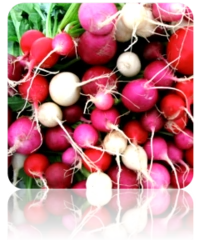
10. Radish - Easter Egg (Appx. 120 seeds)
- The Easter Egg Radish is just as the name suggests ... a mix of flavorful multi-colored radishes! Radishes are red, pink, purple, violet, and white. Excellent in salads. Extremely easy to grow. Grows well in small spaces. 40 Days to Maturity

11. Radish - Pink Beauty (Appx. 160 seeds)
- Produces beautiful pink radishes with a white flesh. Looks amazing! Great for culinary dishes. The white flesh is crisp and mild in flavor. Great for selling at farmers markets. Unique and rare heirloom radish. Grows well in containers and small spaces. 30 Days to Maturity

12. Rutabaga - American Purple Top (Appx. 100 seeds)
- Recommended by USU. Large 5 to 6 inch roots are purple and yellow colored, nearly round. Flesh is yellow, mild and fine grained. 90 Days to Maturity

13. Turnip - Purple Top / White Globe (Appx. 100 seeds)
- Smooth round roots, 4 to 6 inches across are purple on top and white below. Flesh is white, mild, and crisp. Stores well Extremely healthy and nutritious. Very easy to grow. 55 Days to Maturity

14. Turnip - Golden Globe (Appx. 140 seeds)
- A beautiful and delicious turnip with golden color and amazing flavor. The quality and tenderness is best when harvested at 3”. Plant in early spring and/or fall. 55 Days to Maturity

15. Parsnip - Harris Model (Appx. 50 seeds)
- Harris Model Parsnips are 3½" in diameter by up to 12" long. The flesh is white and extremely tender. One of the most popular parsnip varieties around! Very easy to grow - similar to carrots.
-
The Boltardy Beet is a Detroit-type beet originating from Holland which has a beautiful deep-red, ringless flesh and very smooth skin. Boltardy Beets are extremely hardy. Can withstand cool weather. Highly resistant to bolting. 60 days Days to Maturity
All-in-One Spring/Summer Garden Variety Pack
$3999 USDUnit price /UnavailableDescription
All-in-One All-in-One Spring/Summer Variety Pack includes an assortment of our 15 most popular varieties that grow best during the spring & summer months.The seeds are all individually packaged for long-term storage and maximum seed protection.Includes all of the following varieties:1. Basil, Genovese (appx. 120 seeds)
Genovese Basil is a classic! It's prized for being sweet with undertones of a spicy flavor. You can't beat it's aroma. These plants grow anywhere from 18"-24" inches and is the variety of choice for making pesto and adding to pizzas.2. Carrot, Tendersweet (appx. 160 seeds)
One of the sweetest and best tasting carrots you can grow. Skinny 7" tapered roots. Easy to grow. Carrots are a sun-loving plants that also like the cold. Just keep them consistently watered and they'll be happy.3. Chives (appx. 115 seeds)
Also known as Garlic Chives. A perennial plant that grows narrow, grass-like leaves that have a mild onion-like flavor.- Chives are rich in vitamins A and C, contain trace amounts of sulfur, and are rich in calcium and iron. Used for many culinary creations. Perfect for containers and small spaces. The plant will grow to about 12" tall4. Cilantro/Coriander (Appx. 80 seeds!)
This slow-bolting strain is grown primarily for its broad, deep green, celery-like, pungent foliage. Used in Oriental and Mexican cuisine. Use seed to flavor meats, pickles and baked goods5. Cucumber - Marketer (appx. 30 seeds)
The Marketer cucumber is a popular All-America Selections (AAS) Winner! Produces extremely flavorful 9" long dark green cucumbers. Excellent for slicing and salads. Perfect for any sized home garden (and market growers).6. Mint, Spearmint (appx. 280 seeds)
Spearmint is typically used in teas, jellies, deserts, and salads. Extremely fragrant. Sweet smelling. Mentha spicata. Perennial. Can be used as a garnish on ice cream and drinks.7. Pea, Oregon Sugar Pod (appx. 280 seeds)
Mammoth type snow pea with excellent flavor and easy to grow Excellent quality, string present as pod matures. Resistant to Enation Virus, Powdery Mildew and Common Pea Wilt. Vine height 16-30". 4" light green pea pods.
8. Pepper, California Wonder Bell Pepper (appx. 280 seeds)
Large yields of large, mostly 4 lobed, thick-walled fruit that is mild and sweet.Day to Maturity: 75 days9. Pepper, Jalapeno (appx. 25 seeds)
Slightly larger fruit and taller plant with heavy yield. This Jalapeno pepper will produce over a longer period of time. Days to Maturity: 70 days10. Rosemary (appx. 20 seeds)
Excellent flavor. Extremely fragrant. Perfect to use fresh or dried. Can be used to flavor many culinary varieties such as meats, soups, and sauces. Can be used for treating headaches and known to improve circulation. Perfect for containers. Plant Height: 36"11. Squash (Summer) - Black Beauty Zucchini (appx. 10 seeds)
An All America Selections (AAS) Winner. The Black Beauty Squash is one of the most popular varieties on the market. Grows as a compact bush size plant (not as a vine). Produces a dark green, glossy fruit, which is long, straight & slender. Firm, very tender, with excellent flavor.
12. Squash (Summer) - Yellow Crookneck (appx. 10 seeds)
The Early Summer Crookneck is a popular Heirloom squash variety that grows extremely quickly - only 45 days!- Grows as a compact bush size plant (not as a vine)- Produces delicious and beautiful yellow 8" long fruits with a thin curving neck- Fast-growing summer squash produces large yields- Perfect for growing in small spaces13. Thyme (appx. 350 seeds)
Plant spreads to form attractive 8 to 12 inch high mounds.- Aromatic and flavorful leaves- Used to flavor meats, dressings, soups, and stews. Day to Maturity | 80 days14. Tomato, Red Cherry (appx. 15 seeds)
The Small Red Cherry tomato plant produces a lot of small red tomatoes on a tall plant.- Grows 1 1/4" large, sweet, and firm fruits.- Continues to grow for an extended period of time.- Cherry tomatoes have some of the most excellent flavor.- Very easy to grow.- Indeterminate.15. Tomato, Roma (appx. 15 seeds)
Excellent yields of bright red, medium-small, large shaped fruits. Popular for cooking, canning, and paste. Very popular variety. Produces vigorous vines.
Determinate.All-in-One Urban Garden Variety Pack
$3999 USDUnit price /UnavailableDescription
A variety pack designed for urban organic gardener's that want to grow a fall/winter garden with containers and raised beds.
This variety pack includes all of the following 15 varieties:
1. Beet, Detroit Dark Red (appx. 20 seeds)
-
Beet, Dark Red Detroit (100% Heirloom/Non-Hybrid/Non-GMO) This is an all-time favorite beet variety. Recommended by USU. The most popular beet on the market. - The 2 ½ to 3 inch globe shaped roots are tender and...
2. Broccoli, Calabrese (appx. 50 seeds)
-
Broccoli, Calabrese (100% Heirloom/Non-Hybrid/Non-GMO) This popular broccoli variety produces a short, 24 inch plant with medium-large heads. Withstands cold well. Best used for a fall crop. - Extremely flavorful ...
3. Cabbage, Bok Choy (appx. 50 seeds)
-
Chinese Cabbage, Bok Choy (White Stem) (100% Heirloom/Non-Hybrid/Non-GMO) This is the very popular Chinese non-heading Cabbage variety. - Produces loose spoon shaped leaves with thick white ribs. - Tender, crisp an...
4. Carrot, Little Fingers 4" long (appx. 200 seeds)
-
Carrot, Little Fingers (4" Long) (100% Heirloom/Non-Hybrid/Non-GMO) The Little Finger carrots are one of the quickest to grow. - 4" cylindrical roots - Tenderand sweet variety - Many can be grown in a small spa...
5. Carrot, Autumn King 10" long (appx. 100 seeds)
-
Carrot, Autumn King (10" Long) (100% Heirloom/Non-Hybrid/Non-GMO) The Autumn King carrot is one of the more popular varieties to grow. It's split-resistant skin turns to a deep dark orange/red color as it matu...
6. Celery, Tendercrisp (appx. 200 seeds)
-
Celery, Tendercrisp (100% Heirloom/Non-Hybrid/Non-GMO) A very large type of celery with excellent flavor. Days to Maturity: 110 days
7. Chives, Garlic (appx. 115 seeds)
-
Garlic Chives (100% Heirloom/Non-Hybrid/Non-GMO) Also known as Garlic Chives. A perennial plant that grows narrow, grass-like leaves that have a mild onion-like flavor. - Chives are rich in vitamins A and C, contain...
8. Kale, Blue Curled Scotch (appx. 50 seeds)
-
Kale, Blue Curled Scotch (100% Heirloom/Non-Hybrid/Non-GMO) The Blue Curled Scotch is an early Kale variety which will produce tasty greens! - Excellent in salads or steamed. - The blue-green leaves are finely cu...
9. Lettuce, Classic Romaine (appx. 135 seeds)
-
Lettuce, Romaine (100% Heirloom/Non-Hybrid/Non-GMO) Large, upright, full-bodied heads with dark-green, slightly savoyed leaves that are mild and sweet. - Plant reaches about 10 inches tall. Midribs are crunchy and...
10. Lettuce, All-Year-Round (appx. 200 seeds)
-
Lettuce, All Year Round (100% Heirloom/Non-Hybrid/Non-GMO) As its name suggests, this is a lettuce that can be gown throughout the year, though it will require protection with a cloche or cold frame in the cooler mo...
11. Onion, Evergreeen (Bunching) (appx. 100 seeds)
-
Onion, Evergreen (Bunching) a.k.a Scallion (100% Heirloom/Non-Hybrid/Non-GMO) Allium cepa. This plant produces very long and slender bunching onions. - Grown exclusively as green bunching onions. Onions have white sha...
12. Onion, White Sweet Spanish (appx. 100 seeds)
-
Onion, White Sweet Spanish (100% Heirloom/Non-Hybrid/Non-GMO) The White Sweet Spanish variety will produces a globed shaped white onion. - Long day. - This is one of the most popular white onion varieties availa...
13. Radish, Sparkler (appx. 120 seeds)
-
The Sparkler Egg Radish is just as the name suggests ... a mix of round red and white radishes! Excellent in salads. Extremely easy to grow. Grows well in small spaces...
14. Spinach, Bloomsdale (appx. 70 seeds)
-
Spinach, Bloomsdale (100% Heirloom/Non-Hybrid/Non-GMO) Bloomsdale Spinach will produce heavy, glossy, dark green leaves. - Excellent flavor - Extremely easy to grow - Large, curly dark green leaves - Nice sweet t...
15. Swiss Chard, Classic Fordhook Giant (appx. 25 seeds)
-
This Swiss Chard variety produces beautiful and delicious tender pale green stems and dark green leaves with white veins. Plant produces good yields of 10" tall leaves. Excellent for salads and/or steamed with others greens. A cold and heat tolerant variety.
-
continue shopping
YOU MAY ALSO LIKE
View all-
$29999 USDUnit price /Unavailable
-
All-in-One Heritage Tomato Garden Variety Pack
$4499 USDUnit price /Unavailable -
All-in-One Mosquito Repellent Garden Variety Pack
$3999 USDUnit price /Unavailable -
All-in-One Medicinal Herb Garden Seed Bank
$9999 USDUnit price /Unavailable -
All-in-One Pepper Garden Variety Pack
$4499 USDUnit price /Unavailable -
All-in-One Chicken Garden Variety Pack
$3999 USDUnit price /Unavailable -
All-in-One Lettuce & Leafy Greens Variety Pack
$3999 USDUnit price /Unavailable -
All-in-One Culinary Herb Garden Variety Pack
$3999 USDUnit price /Unavailable -
All-in-One Homestead Seed Bank
$9999 USDUnit price /Unavailable -
All-in-One Medicinal Herb Garden Variety Pack
$4999 USDUnit price /Unavailable -
All-in-One Root Crop Garden Variety Pack
$3999 USDUnit price /Unavailable -
All-in-One Fall/Winter Variety Pack
$3999 USDUnit price /Unavailable -
All-in-One Sprouts/Microgreens Variety Pack
$3499 USDUnit price /Unavailable -
All-in-One Hydroponic Greens Variety Pack
$3999 USDUnit price /Unavailable -
All-in-One Fall/Winter Seed Bank
$8999 USDUnit price /Unavailable -
All-in-One Sprouts/Microgreens Seed Bank w/Sprouting Jar
$6999 USD$7999Unit price /Unavailable -
All-in-One Culinary Herb Garden Seed Bank
$8999 USDUnit price /Unavailable -
All-in-One Spring/Summer Seed Bank
$8999 USDUnit price /Unavailable -
All-in-One Urban Garden Variety Pack
$3999 USDUnit price /Unavailable -
All-in-One Cucumber Garden Variety Pack
$2999 USDUnit price /Unavailable -
*NEW!* Wildflower Scatter Garden Variety Pack
$3999 USDUnit price /Unavailable -
All-in-One SAVE THE BEES! Garden Variety Pack
$3999 USDUnit price /Unavailable -
All-in-One Salsa Garden Variety Pack
$4499 USDUnit price /Unavailable -
All-in-One Tower Garden Variety Pack
$3999 USDUnit price /Unavailable
FEATURED SEED COLLECTIONS
View all products listed A-Zcontinue shopping

































































